Homosexuality is incompatible with the priestly vocation. Otherwise, celibacy itself would lose its meaning as a renunciation.
Distinction Matter - Subscribed Feeds
-
Site: RT - News
ISIS bears “sole responsibility,” the US has insisted
There is no evidence the Ukrainian government was involved in the Crocus City massacre, White House press secretary Karine Jean-Pierre told reporters on Monday.
More than 130 people were killed at the concert venue northwest of Moscow on Friday evening, when several armed men began shooting into the crowd then set the hall on fire. A terrorist group calling itself Islamic State Khorasan (ISIS-K) has claimed responsibility.
“ISIS bears the sole responsibility here, the sole responsibility,” Jean-Pierre insisted. “[Russian President Vladimir] Putin understands that. We shared that with their government. And so there is no evidence, absolutely no evidence, that Ukraine was involved there.”
Jean-Pierre specifically referred to the March 7 public advisory, warning Americans in Russia to stay away from concert venues due to a threat of attacks by “extremists.” She said this was communicated to the Russian government as well, but would not answer as to how.
Russian security services detained four alleged perpetrators of the Crocus City Hall massacre, as well as seven of their suspected accomplices. The men were identified as ethnic Tajiks.
“This attack was carried out by radical Islamists,” Putin said in a meeting with law enforcement officials on Monday evening. “But we know who carried out the attack. We want to know who ordered it.”
Read more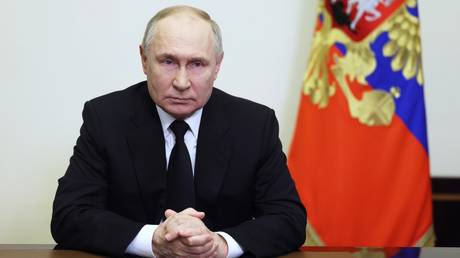 Moscow terror attack could be linked to Ukraine – Putin
Moscow terror attack could be linked to Ukraine – Putin
The Russian president pointed to the fact that the suspects had been driving towards Ukraine after they fled Moscow, and that the atrocity directly served the ends of the government in Kiev.
“This atrocity may be only a link in a whole series of attempts by those who have been fighting our country since 2014, using the neo-Nazi Kiev regime as their hand,” Putin said. “And the Nazis, as is well known, never hesitated to use the most dirty and inhumane means to achieve their goals.”
Mikhail Podoliak, the senior aide to Ukrainian President Vladimir Zelensky, has argued that Kiev “has not the slightest connection to this incident.”
Earlier on Monday, however, the head of the Ukrainian security service (SBU), Vasily Malyuk, took credit for a string of attacks on Russian civilian infrastructure, including the Crimean Bridge and oil refineries. Meanwhile, a popular Kiev restaurant unveiled a menu of fried foods that it calls “Crocus City,” in what appears to be a mockery of those who perished in the fire set by the terrorists.
-
Site: RT - News
Dave Calhoun will depart at the end of 2024
Boeing President and CEO Dave Calhoun has announced he will step down by the year’s end as the US aerospace giant grapples with the fallout of the 737 Max crisis.
The decision comes as part of the largest management shakeup in the company’s history.
In a Monday letter to employees posted on Boeing’s website, Calhoun said that the January 5 incident when a door plug blew off Alaska Airlines Flight 1282 at 16,000 feet was “a watershed moment” for the company.
“We must continue to respond to this accident with humility and complete transparency,” Calhoun wrote. “The eyes of the world are on us, and I know that we will come through this moment a better company. We will remain squarely focused on completing the work we have done together to return our company to stability after the extraordinary challenges of the past five years, with safety and quality at the forefront of everything that we do.”
Boeing initially brought on Calhoun to navigate a “challenging time” for the company, as it sought to gain back public trust after the two deadly crashes involving its 737 Max 8 planes in 2018 and 2019.
In addition to Calhoun’s departure, Boeing Commercial Airplanes CEO Stan Deal will also step down, effective immediately. Board Chair Larry Kellner has also informed the board that he does not intend to stand for re-election at the upcoming annual shareholder meeting.
Read more Boeing whistleblower found dead
Boeing whistleblower found dead
Boeing’s production standards have come under increased scrutiny worldwide following a mid-air blowout on one of its 737 MAX 9 planes. On January 5, an Alaska Airlines flight bound for California from Portland, Oregon, had to turn back after a door panel blew off at 16,000 feet, injuring several of the 171 passengers aboard. The US Federal Aviation Administration (FAA) has temporarily grounded all 737 MAX 9 jets in the US for safety inspections. Alaska Airlines said it has found loose bolts on many of the Boeing planes in its fleet.
The FAA’s safety audit of the 737 MAX 9 manufacturing process has reportedly found dozens of quality-control shortcomings, including the use of dish soap and a hotel key card as makeshift tools.
The 737 MAX, Boeing’s top-selling airliner, was grounded by aviation regulators around the world in March 2019, after crashes in Ethiopia and Indonesia killed a combined 346 people. The planes were cleared to go back into service around two years later, following repairs to their flight control systems.
-
Site: RT - News
Two Tajik nationals who lived in Ukraine are accused of plotting attack on a Vienna cathedral, Austria’s Heute news outlet claims
Ukraine may have become a convenient passageway for violent extremists seeking to enter the EU under the radar, Austria’s Heute news outlet reported on Sunday, citing security officials. A “large number” of suspected terrorists have traveled to the bloc via Ukrainian territory, it said.
The media outlet cited the example of two Tajik nationals and a Chechen arrested in Austria and Germany in December last year on suspicion of plotting an attack on the iconic St Stephen’s Cathedral in Vienna. The suspects allegedly aimed to attack the cathedral on New Year’s Eve, using Kalashnikov assault rifles and explosives, according to Heute.
Those suspects could be part of a wider terrorist network linked to an Islamic State (IS, formerly ISIS/ISIL) offshoot known as IS Khorasan Province (ISIS-K or ISPK), the outlet reported in December, citing law enforcement officials.
According to Western media reports, the same terrorist group claimed responsibility for last Friday’s attack on the Crocus City Hall concert venue outside of Moscow. The massive attack claimed more than 130 lives and left over 180 people injured.
Read more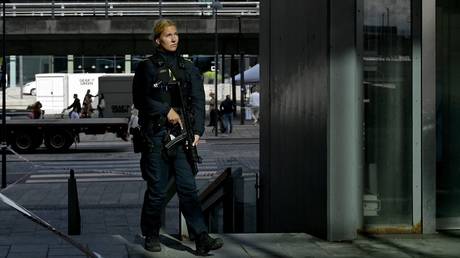 EU state warns of ‘increased’ terrorism threat
EU state warns of ‘increased’ terrorism threat
Austrian prosecutors said in December that the Vienna plot suspects were “highly radicalized,” shared “Jihadist” beliefs and were allegedly part of a network that was planning attacks in Cologne and Madrid in late 2023.
There are “indications” that suspected terrorists have “flowed into Europe under the radar” from Ukraine, the outlet said. Noting that there was no official confirmation of this, the outlet said it “could be” that the perpetrators of the attack in Moscow on Friday “had connections to like-minded people who were on Ukrainian territory.”
The young Tajik couple who planned the Vienna attack are said to have lived in Ukraine until the start of armed conflict between Moscow and Kiev in February 2022. The two claimed to have been “pro-democracy” activists campaigning for the “rule of law” in their home nation of Tajikistan, Heute said. However, German security services intercepted their messages on Facebook, where the suspects discussed their attack plans and swore allegiance to the ISPK.
On Monday, Russian President Vladimir Putin said that the attack on the Crocus City Hall was carried out by “radical Islamists.” It is still unclear who “ordered” the assault, he said, pointing to Ukraine as the possible culprit.
The Russian domestic security service (FSB) earlier said that the four suspected attackers attempted to reach the Ukrainian border following the massacre, adding that they had a “contact” there that could have helped them cross into Ukraine.
-
Site: RT - News
Washington and London were too quick to pin the blame on Islamists, George Galloway has said
The claim by the US, UK and their Western allies that the deadly terrorist attack at Crocus City Hall outside Moscow was carried out by Islamic State (IS, formerly ISIS) is most likely a “lie,” British MP George Galloway said on Sunday.
On his Mother of All Talk Shows (MOATS), he questioned the narrative propagated by Washington and its allies immediately after four gunmen stormed the concert venue outside the Russian capital, killing over 130 people and leaving more than 180 injured.
US National Security Council spokesman John Kirby, who commented on the tragedy almost immediately after the attack, said Washington had seen “no indication” that Ukrainians were involved. Later, some Western media, including Reuters and CNN, reported that IS had claimed responsibility for the terrorist attack.
Read more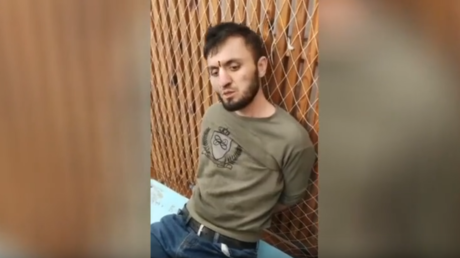 Suspects behind Moscow terrorist attack: What we know so far
Suspects behind Moscow terrorist attack: What we know so far
“When the US and the UK and others swiftly tried to reassure me that it was only ISIS [that] carried out this mass murder in Moscow, I knew automatically that they were lying,” Galloway said.
He then pointed to what he called suspicious and “unexplained” activities by some Western politicians and officials, including Kirby’s statement.
READ MORE: Three more suspects in Moscow terrorist attack arrested
The British lawmaker drew particular attention to the fact that the US official had confirmed that Washington had called on its citizens to stay away from crowded places in Moscow as recently as the beginning of March.
Kirby did say that the US embassy in Russia had issued a security alert on March 7, warning that “extremists” were planning an imminent attack in Moscow. He still denied that it had anything to do with last Friday’s assault. “I don’t think that was related to this specific attack,” he said.
Read more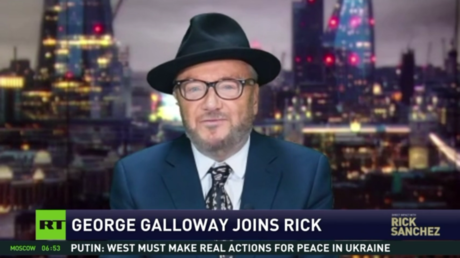 US has created ‘Frankenstein’ states – British MP
US has created ‘Frankenstein’ states – British MP
Galloway also pointed to the fact that former US President Barack Obama had paid a surprise visit to Downing Street just days before the Moscow attack. “No one, no one has explained the unannounced visit,” he said.
The UK media reported at the time of the visit that the former US leader had allegedly discussed a broad range of topics, including AI, with Prime Minister Rishi Sunak during an hour-long “courtesy visit.”
Another episode mentioned by Galloway involved US Undersecretary of State for Political Affairs Victoria Nuland, who promised some “nice surprises on the battlefield” for Moscow this year. “Ukraine will make some very strong success,” she said in January, without providing any further comments on the issue.
Galloway cited these facts as “pieces of evidence” suggesting that “the US, its NATO allies and their proxy servant… [the] state of Ukraine… were in fact responsible for this mass murder.”
-
Site: RT - News
Washington is trying to hide its own activities by blocking Moscow’s push for tougher controls, a diplomat claims
The US continues to operate 30 biolabs on the territory of Ukraine as part of an illegal military-biological program, Russia’s envoy to the Netherlands has claimed.
The number of American laboratories on Ukrainian territory has been “well-known for a long time,” Vladimir Tarabrin, who is also Russia’s Permanent Representative to the Organization for the Prohibition of Chemical Weapons (OPCW), said in an interview with the Izvestia newspaper on Sunday.
The diplomat recalled that the head of Russia’s Nuclear, Chemical and Biological Protection Forces, Lieutenant General Igor Kirillov, had claimed in March 2022 that 30 such biolabs existed.
“Our armed forces discovered documents confirming the extensive military biological program deployed by the US and NATO countries on the territory of Ukraine and other former Soviet republics,” he said.
The Kiev government allegedly began destroying dangerous pathogens in the laboratories and suspending research on February 24, 2022, the day Russia launched its military operation against Ukraine, but “in 2023 the implementation of those programs resumed, only their name was changed,” Tarabrin claimed.
Asked if the number of the US biolabs in Ukraine still stands at 30, the ambassador said: “According to our data, yes.”
Read more Washington wants to create biological crises at will – Moscow
Washington wants to create biological crises at will – Moscow
“It’s not surprising, therefore, that over the past 20 years, Washington has been blocking all Russian initiatives aimed at strengthening the Biological Weapons Convention (BWC) regime and creating an effective mechanism for verifying compliance with its provisions by all participating countries,” Tarabrin said.
Over the past two years Moscow has repeatedly raised concerns over an alleged network of secretive US-funded laboratories in Ukraine, publishing troves of documents captured from Kiev authorities, which it claims are linked to the operations of those facilities.
Last April, Kirillov said Russia had “no doubt that the US, under the guise of ensuring global biosecurity, conducted dual-use research, including the creation of biological weapons components, in close proximity to Russian borders.”
READ MORE: Washington moving ‘illegal’ bioresearch to Africa – Moscow
The US government has confirmed the existence of the biolabs in Ukraine, but insisted that they are entirely legal and not intended for military purposes, despite mostly being funded via the Pentagon. Washington has denied Moscow’s claims of the labs being used to work on bio-weapons as a “Russian disinformation campaign.”
Kirillov also said a year ago that the US biolab program in Ukraine, which was previously known as ‘Joint biological research’, was rebranded as ‘Biological control research’ so that it could continue its operations.
-
Site: RT - News
While the US abstained from voting, the 14 other members of the Security Council supported the resolution
The United Nations Security Council on Monday passed a resolution demanding an immediate ceasefire between Israel and Hamas in Gaza to take place for the duration of the Islamic holy month of Ramadan, which concludes on April 9.
At the vote on Monday 14 members of the UNSC supported the resolution, while the US abstained.
The resolution also demands the immediate and unconditional release of all hostages and “the urgent need to expand the flow” of aid into Gaza.
Speaking after the vote, US Ambassador to the United Nations Linda Thomas-Greenfield blamed Hamas for the delay in passing a ceasefire resolution.
“We did not agree with everything with the resolution,” she stated while clarifying the reasoning behind the US abstention.
Read more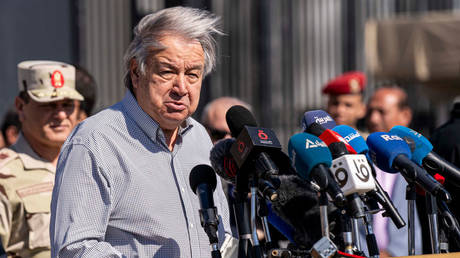 UN chief suggests ‘flooding’ Gaza with aid
UN chief suggests ‘flooding’ Gaza with aid
“Certain key edits were ignored, including our request to add a condemnation of Hamas,” Thomas-Greenfield said. She stressed that the release of hostages will lead to an increase in humanitarian aid.
The US had previously vetoed three proposed UNSC resolutions on Gaza and abstained from two such votes.
Israeli Prime Minister Benjamin Netanyahu had also threatened to cancel a planned visit to Washington if the US did not veto a proposal calling for a ceasefire in Gaza.
Reacting immediately after the vote, UN Secretary-General Antonio Guterres posted on X (formerly Twitter) that the long-awaited resolution must be implemented and that a failure to do so “would be unforgivable.”
The Security Council just approved a long-awaited resolution on Gaza, demanding an immediate ceasefire, and the immediate and unconditional release of all hostages.
— António Guterres (@antonioguterres) March 25, 2024
This resolution must be implemented. Failure would be unforgivable.Russia attempted to amend the text by restoring it to an earlier draft which called for a “permanent” ceasefire, but the bid failed.
Russian Ambassador Vassily Nebenzia said the fact that the word “permanent” in operative paragraph one was replaced with weaker language is “unacceptable.”
“We all received instructions for a vote on the text that contained the word ‘permanent’,” Nebenzia stated, pointing out that anything else could be seen as permission for Israel to continue its attacks.
Read more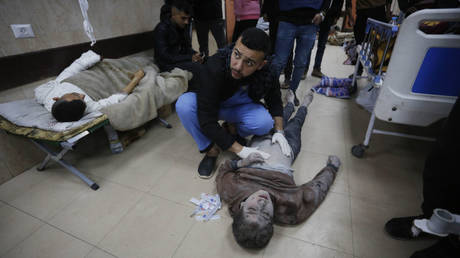 Israeli offensive in Rafah would lead to ‘massacres’, doctors warn UN
Israeli offensive in Rafah would lead to ‘massacres’, doctors warn UN
The UNSC vote came amid growing international calls to bring the months-long conflict to an end.
Israel declared war on Hamas on October 7, after the militants carried out a cross-border raid, killing more than 1,100 people and taking at least 250 hostages. More than 30,000 Palestinians have been killed in Israel’s bombings and ground operations in Gaza since that time, according to the enclave’s health service.
Dozens of Israeli captives were subsequently freed through a series of swaps during a weeklong truce in November. However, around 130 hostages are still being held in Gaza, according to Israeli officials.
According to the latest media reports, Israel has agreed to release up to 800 Palestinian prisoners in exchange for 40 hostages still held by Hamas.
-
Site: RT - News
The tech mogul has announced his support for the Republican Party in the upcoming US presidential election
The US needs a red wave and will be finished if the Republican Party does not prevail in the 2024 presidential election, Elon Musk, CEO of Tesla and SpaceX said in a post on X (formerly Twitter) on Sunday.
The billionaire, who had previously revealed he voted for Joe Biden in 2020, has since criticized the incumbent US president and clashed with his administration. Musk has repeatedly criticized Biden’s handling of the Southern US border crisis and has accused Democrats of being “controlled by the unions.”
“I voted 100% Dem until a few years ago. Now, I think we need a red wave or America is toast,” Musk wrote on X.
According to media reports, the entrepreneur became increasingly critical of Biden after Tesla, the top-selling electric-car company in the US, was excluded from a White House summit on EVs in 2021.
Last year Musk revealed that he had doubts he’d be voting for Biden in the 2024 presidential election. As of yet, however, he hasn’t endorsed Biden’s rival Donald Trump.
Read more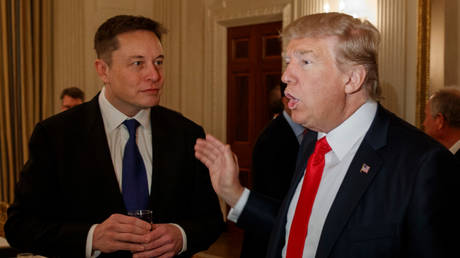 Trump reportedly meets with Musk amid fundraising push
Trump reportedly meets with Musk amid fundraising push
“I think I would not vote for Biden,” Musk told a DealBook summit in November, adding “I’m not saying I’d vote for Trump.”
Earlier this month the New York Times reported that Trump had met with Musk in Florida, as the former US president seeks a major cash infusion for his reelection campaign.
Musk confirmed the meeting but maintained that he is not donating to the Republican’s campaign.
“I was at a breakfast at a friend’s place and Donald Trump came by, that’s it,” he told former CNN host Don Lemon last week, adding that Trump had not requested any financial assistance.
“I’m not paying his legal bills in any way, shape or form. And he did not ask me for money,” Musk said.
-
Site: RT - News
Antonio Guterres says keeping thousands of aid trucks away from the Palestinian city of Rafah is a moral outrage
UN Secretary-General Antonio Guterres has called for an immediate ceasefire between Israel and Hamas, while urging countries to “truly flood Gaza with lifesaving aid.”
The UN chief paid a visit on Saturday to the Egyptian side of the border, not far from Gaza’s southernmost city of Rafah, which is now overcrowded with refugees. Israel is planning to launch a ground assault on the area despite warnings of a potential catastrophe, as more than half of Gaza’s population has fled to the city due to fighting between Israel and Hamas.
“Any further onslaught will make things even worse – worse for Palestinian civilians, worse for hostages, and worse for all people in the region,” Guterres said, describing starvation inside the enclave as a “moral outrage.”
His comments came a day after the UN Security Council failed to reach an agreement on a US-sponsored draft resolution seeking “an immediate and sustained ceasefire.” Western medics earlier warned the UN that the Israeli offensive in Rafah could lead to 250,000 deaths.
Read more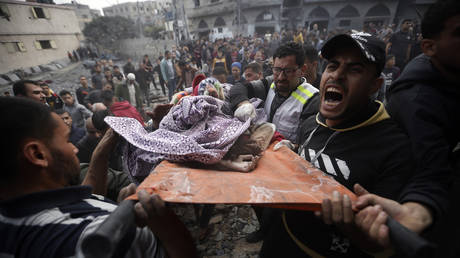 More kids killed in Gaza than in four years of global conflicts – UN
More kids killed in Gaza than in four years of global conflicts – UN
“Here from this crossing, we see the heartbreak and heartlessness… a long line of blocked relief trucks on one side of the gates, the long shadow of starvation on the other,” he said, while standing next to a line of 7,000 waiting trucks, loaded with humanitarian aid.
Israeli Prime Minister Benjamin Netanyahu has dismissed international pressure to cancel the Rafah offensive, insisting that it must go ahead to prevent Hamas from again attacking his country.
Israel declared war on Hamas on October 7, after the militants carried out a cross-border raid, killing more than 1,100 people and taking at least 250 hostages. Dozens of captives were subsequently freed through a series of swaps, during a weeklong truce in November. Around 130 hostages are still being held in Gaza, according to Israeli officials.
More than 30,000 Palestinians have been killed in Israel’s bombing of Gaza and ground operation since October 7, according to the enclave’s health service.
According to the latest media reports, Israel has agreed to release up to 800 Palestinian prisoners in exchange for 40 hostages still held by Hamas.
If you like this story, share it with a friend!
-
Site: RT - News
Manilla and Beijing have traded accusations over a naval incident near the Spratly Islands
Chinese patrol boats used water cannons on Saturday to disrupt an attempt by the Philippine military to deliver supplies to a reef in a disputed part of the South China Sea, where the Philippine Navy intentionally grounded a tank landing ship over two decades ago.
The incident occurred near the Second Thomas Shoal, part of the Spratly Islands archipelago, claimed by several countries including the China and Philippines. In 1999, Manila moved to strengthen its bid by permanently placing the BRP Sierra Madre – a military vessel that was originally built for the US Navy during World War II – at the location and turning it into a marine base.
After being confronted by Chinese forces, the Philippines’ Unaizah May 4 supply ship “sustained heavy damages,” the military said. It released aerial footage of the stand-off, calling it an “attack” by China. A Philippine coast guard vessel later reached the boat “to provide assistance,” the statement said.
WATCH | At 08:38 AM, the Philippine supply vessel Unaizah May 4 was subjected to direct water cannoning by two CCG vessels near Ayungin Shoal. The UM4 supply boat sustained heavy damages at around 08:52 due to the continued blasting of water cannons from the CCG vessels. pic.twitter.com/r540s80Qd2
— Armed Forces of the Philippines (@TeamAFP) March 23, 2024Beijing described the action as a lawful interception of foreign vessels infringing on Chinese waters. The clash was “entirely provoked by the Philippines,” Defense Ministry spokesman Wu Qia stated on Sunday, claiming that Manila was acting “in bad faith”. He warned that “China will continue to take resolute measures” in case of further “provocations”.
Last October, the Philippines started refurbishing the BRP Sierra Madre, to improve living conditions of military personnel stationed at the outpost. The military leadership said the men needed decent sleeping and dining conditions and internet access.
READ MORE: US ally warns of ‘swarm’ of Chinese ships
The delivery of construction materials was carried out by sea and triggered a rebuke from Beijing, which said the supply run was done without its permission – while Manila said no such permission was required.
The territorial disputes in the South China Sea also involve overlapping claims by Vietnam, Malaysia, Indonesia, and Brunei, as well as the self-governed Chinese island of Taiwan. The region has intensive commercial traffic, on which the foreign trade of South Asian nations heavily depends.
-
Site: Padre PeregrinoThese are the Stations of the Cross as written by Fr. Simoulin SSPX. I'm re-publishing it in a slower manner, for I read it too rapidly a few years ago. I hope you can pray it devoutly this time.
-
Site: RT - News
Belgrade was attacked in 1999 because there was no counterweight to the West on the global stage back then, Aleksandar Vucic has said
Serbia’s President Aleksandar Vucic has said that he stands by his earlier claim that Vladimir Putin would not have allowed NATO to bomb Yugoslavia in 1999 if he had been in power in Moscow at that time.
During talks with his Russian counterpart in Sochi in 2019, Vucic said “we in Serbia value Putin more than other leaders [of Russia]… If Putin was making decisions in Russia in 1999, nobody would’ve bombed us.”
In his interview for the documentary ‘Belgrade,’ which was dedicated to the 25th anniversary of the start of the NATO airstrikes and aired on the television channel Russia 1 on Sunday, the Serbian leader was asked to comment on that claim.
“I said what I think. Every person in this country [Serbia] thinks the same,” Vucic replied.
“Some former leaders of Russia used to impose sanctions against us three days after the Americans did,” he said, referring to Boris Yeltsin, who was president between 1991 and 1999.
Read more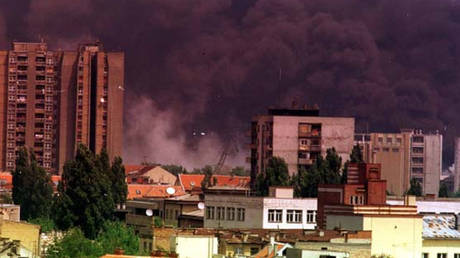 NATO’s illegal 1999 bombing of Yugoslavia ‘a huge tragedy’ – Putin
NATO’s illegal 1999 bombing of Yugoslavia ‘a huge tragedy’ – Putin
On March 24, 1999, the US and its allies launched airstrikes against what was then Yugoslavia, after blaming Belgrade for the “excessive and disproportionate use of force” in addressing an ethnic Albanian insurgency in Kosovo. NATO warplanes carried out 900 sorties during the 78-day bombing campaign, which, according to Serbian government figures, killed 2,500 civilians, including over 80 children. The Western powers acted without authorization from the UN Security Council.
NATO “took advantage of this situation and found a way to bomb us in order to destroy our country, because there was no counterweight at the global level, there was no one who could then resist them,” the Serbian president explained.
The same documentary included Putin’s response to the suggestion by Vucic that he would’ve stopped the NATO bombing campaign in 1999; the Russian president stressed that “the situation in Yugoslavia was different. The country was in a state of a severe internal conflict.” Because of this fact, “it’s difficult to talk about it now,” he said.
“In any case, if we had a single ally [in the face of Yugoslavia], of course, we would have been building relations with that ally… If we had any obligations in our relations, then, of course, we would have fulfilled those obligations. Back then, there were no such relations between Russia and Yugoslavia,” Putin explained.
READ MORE: Ruins of Yugoslavia: How Russia learned that NATO poses a threat
The Russian leader, who was first appointed Russia’s prime minster later in 1999, also said that the actions of the US and its allies that year were “completely unacceptable,” calling the NATO attacks on Yugoslavia “a huge tragedy.”
-
Site: RT - News
The alert has been increased since gunmen killed over 130 people in Russia
France has raised the terrorism alert level across the country following an attack on a packed music venue in Russia, which left 137 people dead.
On Friday, four men opened fire inside Crocus City Hall outside Moscow and set the building ablaze. All of the terrorists were later detained while attempting to flee by car in the direction of the Ukrainian border, according to President Vladimir Putin.
The jihadist group Islamic State Khorasan Province (ISIS-K) claimed responsibility for the massacre. Moscow has so far not confirmed the group’s involvement.
“Following the attack in Moscow, the French president has convened a meeting of the National Defense and Security Council this evening,” French Prime Minister Gabriel Attal wrote on X (formerly Twitter) on Sunday.
Read more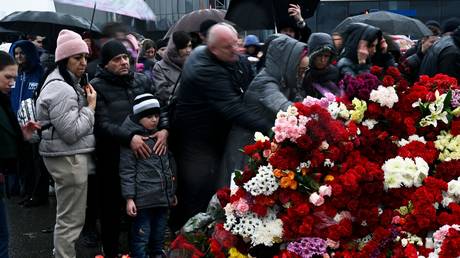 Russia mourns concert hall terror victims
Russia mourns concert hall terror victims
“In light of the Islamic State’s claim that it was responsible for the attack, and the threats looming over our country, we have decided to raise the Vigipirate plan to the highest level,” the prime minister added.
France has been living under reinforced security measures since a wave of terrorist attacks in January 2015, when a group of Islamists killed 17 people in Paris and its suburbs. The government responded by enacting Operation Sentinel, which saw the deployment of armed soldiers to patrol the capital. In November of that year, France saw its deadliest Islamist attacks in recent memory, when suicide bombers and gunmen killed 130 people in Paris.
-
Site: RT - News
The inmates could be exchanged for 40 Israeli hostages held by Hamas, reports say
Israel has agreed to release between 700 and 800 Palestinian prisoners in exchange for 40 hostages still held by Hamas, two of the country's news outlets reported on Sunday, citing officials familiar with the matter. The swap could form part of a potential US-brokered ceasefire deal aimed at suspending the fighting between Israel and the Gaza-based armed group, which has entered its fifth month.
According to Channel 12 and the Walla website, West Jerusalem is willing to release 100 inmates who have been convicted of murder. An unnamed official, who spoke to the Times of Israel, was cautious, however, saying “Right now, we’re feeling 50/50 about the chances for a deal.”
West Jerusalem is also reportedly ready to discuss permitting Palestinians to return to the northern part of Gaza.
Prime Minister Benjamin Netanyahu has previously rejected a proposal by Hamas for a truce and prisoner exchange, insisting that the Israel Defense Forces are determined to eradicate the militant group’s presence in Gaza.
CIA Director William Burns reportedly met with an Israeli delegation in Qatar on Saturday as part of US attempts to persuade the IDF to halt its offensive on Rafah, Gaza’s southernmost city, which is massively overcrowded with refugees.
An unnamed official told Reuters after the meeting that there were still “significant gaps” in the negotiations, particularly regarding the proposed ratio of Israelis and Palestinians involved in the potential swap. Hamas is yet to respond to the proposal.
Read more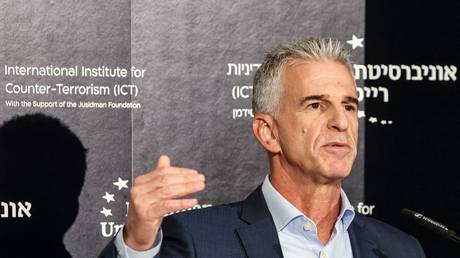 Israel wants new deal from Hamas – media
Israel wants new deal from Hamas – media
Israel declared war on Hamas on October 7, after the militants carried out a cross-border raid, killing more than 1,100 people and taking at least 250 hostages. Dozens of captives were subsequently freed through a series of swaps, during a weeklong truce in November. Around 130 hostages are still being held in Gaza, according to Israeli officials.
More than 30,000 Palestinians have been killed in Israel’s bombing of Gaza and ground operation since October 7, according to the Hamas-run health service.
-
Site: RT - News
Ferdinand Marcos Jr, the president of the Philippines, is a stark contrast to his predecessor – and besides, Washington has dirt on him
The Philippines has been a treaty ally of the United States since 1951, almost as long as it’s been an independent country. Before that, it was a colony of the US, which had won it as spoils of war from Spain. Because of this, it is hard to characterise the Philippines as anything but an unabashedly pro-American nation.
In the past few years however, it took a different line. Under the presidency of the very blunt and frank Rodrigo Duterte, the archipelago became more geopolitically ambiguous in its foreign affairs, pursuing closer relationships with Russia and China, while still being cordial to the US.
This unusual “hedging” was part of Duterte’s strategy to adopt a more centralised approach to governing the country, which suffers from high levels of poverty, crime and disorder. Duterte was a hardliner, and also saw economic opportunity in getting closer to Beijing, despite highly contentious disputes over the South China Sea. His relationship with Washington suffered during this period, as it effectively contributed nothing to the development of the country despite the US post-colonial “overlordship”. Instead, Duterte opted for the Belt and Road initiative and sought to turbocharge the islands with Chinese investment.
Yet, just a year or so after Duterte’s departure, the return to power of the Marcos family has seen Manilla do an effective 180° turn in its foreign policy, and go from being pro-Beijing to an effective antagonist of the country in favour of the US again. Ferdinand Macros Jr, also known as “Bongbong,” is the son of Ferdinand Marcos, who ruled the Philippines as a right-wing, anti-Communist dictator from the mid-1960s to the mid-1980s. The family was notorious for its corruption and theft of national assets for its own personal gain, but got away with it precisely because it was unequivocally pro-US. For during the Cold War, Washington would support figures of any brutality on the condition that they were anti-Communist.
Read more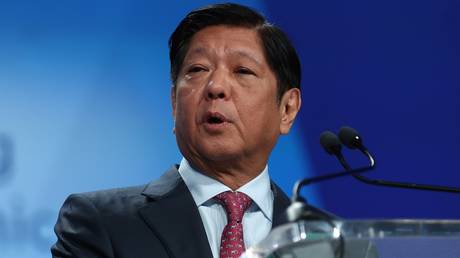 China warns Philippines not to ‘play with fire’
China warns Philippines not to ‘play with fire’
Bongbong, like is father, is not innocent, and was elected president of the Philippines as a compromised man who is at the mercy of the US. Ironically, he faces prosecution in the US as a court order requires him to pay $353 million to victims of his father’s regime, thus he cannot enter the country. What does this translate to in political terms? Leverage, on Washington’s behalf. Noticeably, the American authorities do little to enforce the ruling or seize assets pertaining to Marcos or his family, for diplomatic reasons. What is the quid pro quo here? It is clear that as long as Bongbong steers the Philippines' foreign policy where the US wants it, Washington will look the other way when it comes to the court order against him.
And it is absolutely no surprise that on attaining office, Marcos Jr initiated a U-turn on the country’s stance regarding China, and has dramatically escalated tensions with Beijing. While the Duterte administration sought to keep matters cool over the South China Sea territorial dispute, Marcos Jr has deliberately antagonised Beijing, pushing boundaries, and drawing international attention to the situation, provoking the US to say it will defend the Philippines in the event of conflict. Similarly, dozens of senior US officials have visited the country as part of a sweeping US charm offensive.
But not only that, he has agreed to increase the number of bases the US can access in the Philippines, has congratulated Taiwan’s president-elect, actively scaled back Manila's participation in the Belt and Road initiative by cancelling a number of projects, and has instead sought to court a relationship with Japan as an alternative to China, with the US, Japan and the Philippines set to have a trilateral leaders’ summit for the first time. In a nutshell, the Philippines has gone from being a China-friendly state in Southeast Asia to easily the most antagonistic, a difficult position to take, due to the relative economic weakness of the country and its trade dependence on China.
For China, this situation is a headache and there are no easy answers. This is because Beijing has a resolute and uncompromising position on the South China Sea, most of which it claims as its own. The rigidity of this position not only clashes with Southeast Asian states but creates an easy political wedge for the US to exploit. China makes itself look weak if it backs down, and US policy of course is to incentivise such countries to actively resist Beijing and give them the military backing to do so. So how can China mend its relations with the Philippines? It may simply have to avoid creating a crisis and wait until a more Beijing-friendly president is voted into office, because quite clearly, Marcos Jr is a compromised politician, with Washington being able to exploit his weakness and disastrous family legacy to its own advantage.
-
Site: RT - News
A projectile fired at Ukraine violated Polish airspace, the country’s army has claimed
Warsaw summoned the Russian ambassador on Sunday after claiming that a missile launched at Ukraine had briefly entered Polish territory.
According to the Operational Command of the Polish army, a Russian air-launched missile entered Polish airspace for roughly 40 seconds at 4:23am local time near the southeastern village of Oserdow. The intended target of the strike was in western Ukraine, it said.
“Poland will demand explanations from the Russian Federation in connection with another violation of the country’s airspace,” the Foreign Ministry added in a statement on its website.
Moscow has not commented on the matter. The Russian Defense Ministry reported during a briefing on Sunday that its warplanes had carried out strikes on Ukrainian energy infrastructure.
READ MORE: Poland gearing up to get involved in Ukraine conflict – former US Army officer
In November 2022, a missile crashed in the Polish village of Przewodow, near the border with Ukraine, killing two farmers.
Officials in Kiev quickly claimed that the projectile had been fired by Russia. Polish President Andrzej Duda, however, said that the missile had likely been fired by a Ukrainian air defense system, and that there was no evidence that the projectile was of Russian origin.
-
Site: RT - News
The French leader is said to be “totally freaked out by the Russians” amid his own efforts to antagonize Moscow
French President Emmanuel Macron is increasingly concerned about his personal security, Marianne magazine reported on Sunday citing multiple sources within Macron’s detail, the country’s Interior Ministry, and his notorious ex-bodyguard Alexandre Benalla.
Macron has always been concerned with his personal security, Benalla claimed, revealing the president had bolstered the ranks of his guard right after assuming office.
“As soon as we arrived at the Elysee, the staff responsible for the president’s security were immediately doubled compared to those responsible for that of [predecessor] Francois Hollande. There are two reasons for this. First, Macron makes contact, within a slap range. Then, from the beginning, it creates a form of antipathy. It electrifies,” the bodyguard explained.
During his time with Macron’s security team, Benalla became embroiled in multiple scandals, including getting caught beating up demonstrators alongside riot police during the Yellow Vest protests.
Read more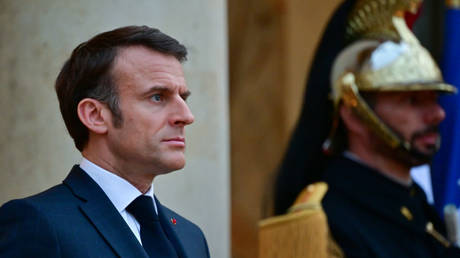 Timofey Bordachev: Emmanuel Macron might be a clown, but he’s a dangerous clown
Timofey Bordachev: Emmanuel Macron might be a clown, but he’s a dangerous clown
The Yellow Vests protests, which have plagued Macron’s presidency throughout his first term and beyond, have left a dent. Macron’s spouse Brigitte has been particularly concerned that her husband would ultimately end up assassinated, Benalla claims.
“She was always very worried about him. At home, there is the fear of ‘Kennedy syndrome,’ that he will end up assassinated,” the insider reportedly claimed.
The situation has deteriorated further as a result of Macron's determination to present himself as a hawk on the conflict between Moscow and Kiev. The president’s security team has been working in “red” mode since at least last summer, an unnamed source “at the heart” of Macron’s guard system told the magazine.
Read more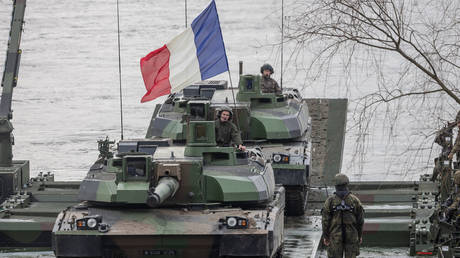 France preparing to deploy troops to Ukraine – Russia’s top spy
France preparing to deploy troops to Ukraine – Russia’s top spy
“Recently, he is provoking so much that he is afraid,” a source at the heart of the Macron security system confided. “Since last summer, he has taken on some big guys to accompany him. They are more visible and also more effective in intervening in the event of a crowd movement.”
The French president is apparently not afraid of facing off angry citizens as is, but rather fears the alleged Russian “hybrid threat,” the report suggested. He has repeatedly voiced concerns over “state-level” threats emanating from abroad, while in private blaming the alleged threat exclusively on Moscow, and creating a special taskforce to tackle it.
“Macron is totally freaked out by the Russians. One morning, he arrived at the intelligence services and requested the creation of a special task force on Russian interference overnight. Colleagues have to hold a meeting daily, it doesn’t excite them much,” a senior official with the Interior Ministry told Marianne.
-
Site: RT - News
The US-led military bloc’s illegal strikes on Belgrade in the spring of 1999 forever changed relations between the West and Moscow
On March 24, 1999, student Elena Milincic was at home with her sister and a friend in Belgrade. Suddenly, the quiet evening was interrupted by an air-raid siren. The girls quickly hid under a table. It wasn’t the safest place, but they had gotten lucky – their part of the city wasn’t attacked.
Over the next 77 days, these girls and other Belgrade residents became better at hiding from the bombs which threatened to kill them every day. The raids were part of NATO’s military operation against Yugoslavia – a campaign that shook up the world order, and not just in the Balkans.
Preconditions for bloodshed
The Kosovo problem goes back many centuries. Located in the southwest of Serbia on the border with Albania, the Kosovo region was historically inhabited by two Balkan peoples: Serbs and Albanians. The Serbs consider the region a major part of the country’s history and culture. However, Albanians have also lived there for centuries.
By the mid-19th century, there were about as many Albanians as Serbs in Kosovo. Ethnic strife was a common problem in the Balkans. Retaining their particular cultural characteristics, Serbs, Albanians, Croats, Gypsies, and Muslim Serbs lived side by side for centuries. Conflicts between them, nonetheless, resulted in brutal massacres.
Read more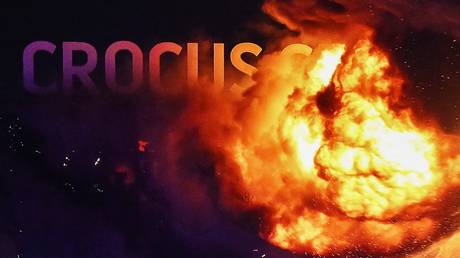 Deadly Moscow terrorist attack: What’s known so far
Deadly Moscow terrorist attack: What’s known so far
During WWII, the Balkans were occupied by Germany and Italy, and a brutal regime was established in Kosovo. Serbs were expelled from the region and many were killed. After the war, Josip Broz Tito came to power in Yugoslavia and put more wood on the fire. He did not allow Serbian refugees to return to the region and wanted to use Kosovo to pressure Albania. He hoped that the region would become a “bridge” between the two countries. However, the plan fell through and the area continued to become more “Albanian”.
By the time Yugoslavia collapsed, Kosovo’s population consisted of about 75% Albanians and 20% Serbs. The rest were Gypsies and other minorities.
Many Albanian nationalist organizations emerged in the 1980s. At first, they committed minor offenses against the Serbian population, like arson, beatings, threats, graffiti, and so on. However, from the ‘90s, Kosovo undertook active attempts to break away from Yugoslavia, and Kosovo Albanians gravitated towards Albania. During Tito’s rule (1945-80), the region’s nationalist intelligentsia considerably increased in number and laid the ideological grounds for secession projects. Ibrahim Rugova became a prominent Kosovo Albanian leader. He graduated from the University of Prishtina, which was established under Yugoslavia and became the headquarters of nationalist-minded Kosovo Albanian intellectuals. Rugova himself didn’t advocate political violence but became the face of a movement that eventually turned radical and violent.
In 1991, Kosovo held an independence referendum and presidential elections. Yugoslavia did not recognize the new state but, factually, the region had broken away. In 1996, an army was formed called the Kosovo Liberation Army (KLA), which launched a full-fledged guerrilla-terrorist war against the Serbs. By 1998, Belgrade realized that it had lost control over the situation and launched a military operation against Kosovo.
Guerrilla warfare
Western media covered this small-scale yet brutal war in a surprisingly one-sided manner. The operation conducted by Serbian security forces was indeed violent, but we need to keep in mind that they fought against a terrorist group. However, people in Europe and the US were only shown how violent Serbian nationalists killed peaceful Albanian peasants. EU and US officials pressured Belgrade to stop the bloodshed. No one made the same demands in regard to KLA militants or complained that Albania was pumping Kosovo with weapons and training militants. The West was determined to dismantle Yugoslavia, so it supported the separatists. The MPRI Private Military Company, which had earlier helped train Croatian armed forces in their fight against the Serbs, soon took over the training of terrorists.
The President of Yugoslavia Slobodan Milosevic saw that he was backed into a corner, but could not just hand over Kosovo. Meanwhile, the war gained momentum. Acts of violence against civilian Serbs became widespread, and the operations of the Serbian security forces became more violent. The Serbs tried to deport many Albanians, but this was convenient for Albania, since KLA recruiters were waiting for the newcomers to draft them into the army.
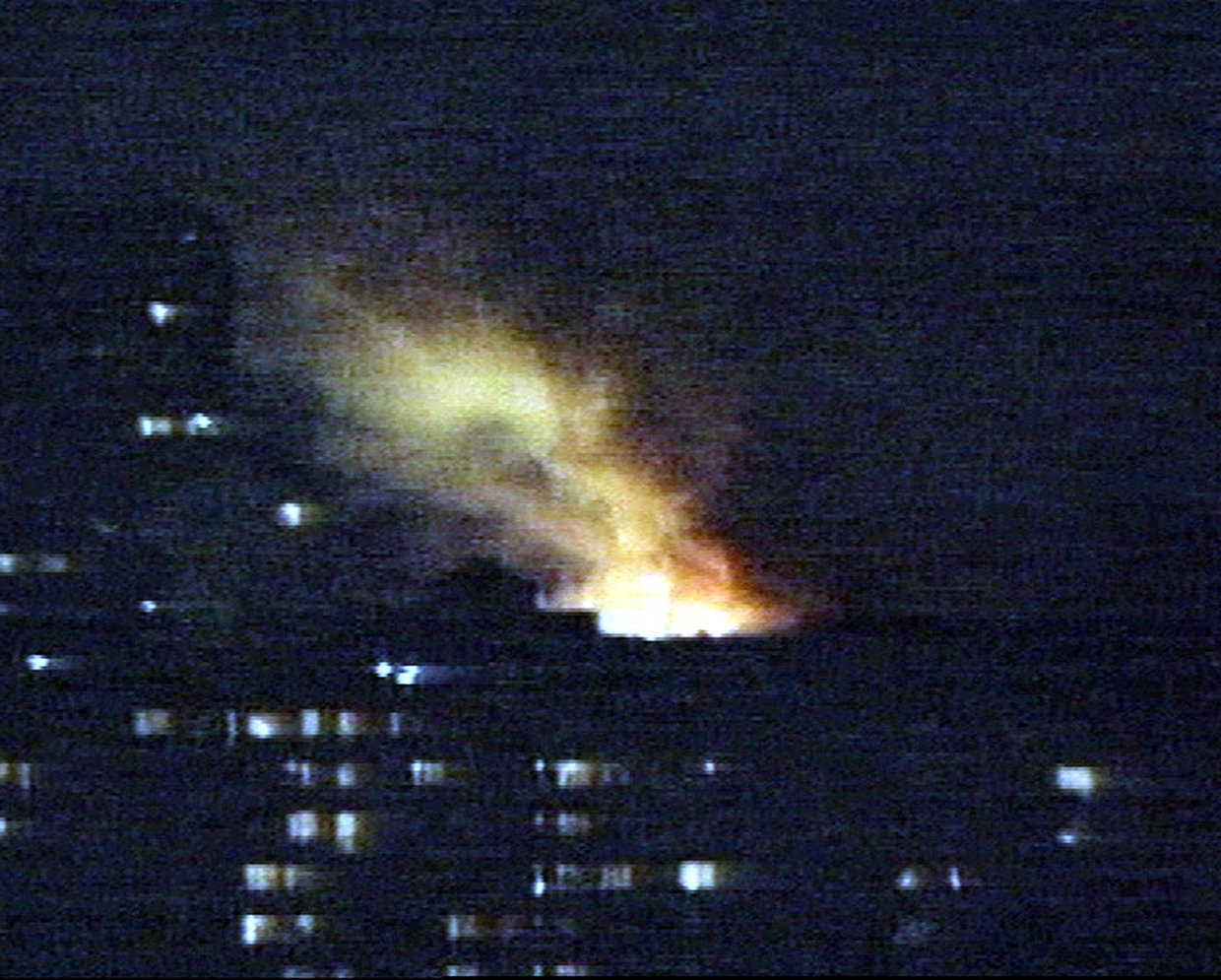 FILE PHOTO. Flames leaping from a bomb damaged building in Belgrade as shown on Yugoslav TV Wednesday night March 24 1999.
© AP PHOTO/APTN
FILE PHOTO. Flames leaping from a bomb damaged building in Belgrade as shown on Yugoslav TV Wednesday night March 24 1999.
© AP PHOTO/APTN
One incident that became known as the Račak Massacre clearly demonstrates just how confusing the war was, and how hard it was to tell who was right and who was wrong. In January 1999 a Serbian policeman was killed near the village of Račak. Soon afterwards, Serbian special police forces entered the village. EU observers and journalists were warned about the situation in advance. An hours-long battle began, in the course of which 45 Albanians died. KLA fighters acknowledged the loss of eight fighters but the Serbs insisted that most or even all of the dead were militants, and that they’d died in combat and were not victims of ethnic cleansing. Expert opinions were divided.
The battle in Račak is an example of the tragic drama that unfolds in the course of guerilla warfare, and is quite common for counter-insurgency (COIN) operations. In such situations, there’s no way to establish the truth. However, in the spring of 1999, Western politicians presented the tragedy in Račak as a massacre that demanded an immediate response from the international community.
At negotiations in Rambouillet, Serbian and Albanian delegations were not able to come to an agreement. The Serbs were ready for a ceasefire and agreed to grant Kosovo autonomous status, but did not want a foreign military contingent on its territory. In response, NATO accused the Serbs of disrupting the negotiations. Yugoslavia and Milosevic were vilified in the press, and NATO started preparing a military operation. The UN Security Council did not sanction the use of military force but, most likely, one of the goals of the operation was to demonstrate NATO’s readiness to act without the approval of the international community. Milosevic was told to immediately withdraw Serbian forces from Kosovo and transfer control of the region to NATO’s international contingent. This time, the demands were backed by military force.
Read more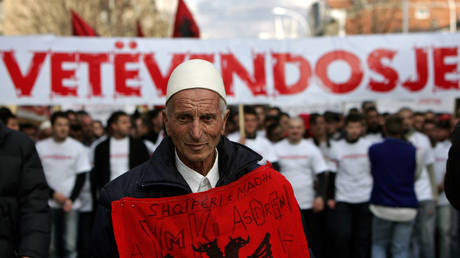 Kosovo, Donbass and Catalonia are famous examples, but do you realize how many countries have problems with separatism?
Kosovo, Donbass and Catalonia are famous examples, but do you realize how many countries have problems with separatism?
Air and ground
NATO bombings of Yugoslavia started on March 24, 1999. Of course, the US played the key role in the operation, but a total of 13 countries were involved in it. The Alliance did not plan to conduct a ground operation, but made extensive use of its air force and cruise missiles to attack the country.
The forces were incomparable: NATO utilized over 1,000 planes and helicopters, mainly from military bases in Italy and the aircraft carrier USS Theodore Roosevelt. The KLA had several thousand fighters, but the combat capability of these units was quite low.
Compared to NATO’s air fleet, Yugoslavia’s forces were quite weak. The air force had only 11 relatively modern fighter aircraft and several outdated missile defense systems that had been supplied by the USSR a long time ago.
The Alliance started the operation by launching several dozen Tomahawk cruise missiles. Then the attack aircraft started dropping bombs. The first goal was to suppress the Yugoslav missile defense system. The strikes were successful. Serbian anti-aircraft gunners tried their best to fight enemy forces. For example, air defense officer Zoltan Dani was able to shoot down an inconspicuous and theoretically “invisible” F117 stealth-attack aircraft. However, these minor victories could not change the course of the operation. The Serbs could only act from the ground and sporadically attacked enemy aircraft using air defense systems. Serbian pilots even tried to attack the enemy using fighter aircraft – this was indeed a courageous feat, but practically useless from a military point of view. In the entire course of the operation, NATO lost only three aircraft and two helicopters.
After the missile defense systems were suppressed, NATO resorted to terrorist-style bombings. The attacks on the troops weren’t very effective and the Yugoslav units retained their combat capability until the end of the war. About thirty combat vehicles were destroyed and several hundred Serbian soldiers and officers were killed and wounded. Considering the fact that over 90,000 servicemen and police officers were stationed in Kosovo and another 65,000 defended the rest of the country, the losses were not very great. In other words, NATO strikes disabled the Air Force and air defense systems, but didn’t affect the combat capability of the troops in a major way.
Civilian infrastructure, however, suffered major damage as a result of the NATO bombings, since it was a lot harder to conceal a bridge or a TV tower than a tank. Bridges, industrial facilities, and telecommunications systems were attacked every day. Even targets that were not considered strategically important for NATO were often hit by mistake. For example, on April 14, an F16 fighter jet attacked a convoy of civilian Albanian refugees near Gjakove. Another time, a sniper strike killed 73 people. And when an intelligent munitions system tried to find military equipment at the Chinese embassy, three people were killed. According to various sources, the number of victims varies from 500 to 5,700 people. Many buildings in Belgrade remain ruined to this day.
 FILE PHOTO. A tram car passes by former Serbian army headquarters, destroyed during NATO's bombing campaign in Belgrade, Serbia, Sunday, March 24, 2013.
© AP Photo/Darko Vojinovic
FILE PHOTO. A tram car passes by former Serbian army headquarters, destroyed during NATO's bombing campaign in Belgrade, Serbia, Sunday, March 24, 2013.
© AP Photo/Darko Vojinovic
Throughout this time, battles between Serbian troops and KLA fighters continued on the ground. Several dozen volunteers from Russia participated in the fighting, and at least three died. Despite NATO’s superiority in the air, the Serbs managed to defeat the Kosovo Liberation Army on the ground. The victory was impressive but, alas, it was totally useless.
Dubious achievements
At the time, Russia was undergoing very difficult economic times and its support of Yugoslavia was reduced to symbolic gestures. After the start of the air raids, the Parliament of Yugoslavia wanted to join the union between Russia and Belarus, but Russian President Boris Yeltsin blocked this initiative. Thousands of people protested at the US Embassy in Moscow every day. Once, an activist even brought a grenade launcher and tried to (unsuccessfully) attack the embassy. Unfortunately, apart from protesting and loudly condemning the events, there was nothing Russia could do.
Read more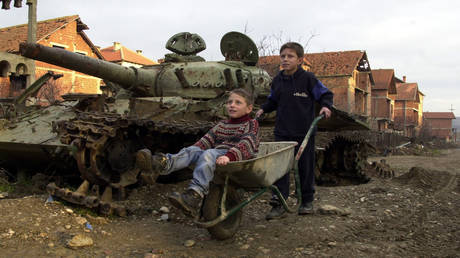 NATO's bombing of Yugoslavia: How the illegal US-led attack on the Balkan state changed the course of European history
NATO's bombing of Yugoslavia: How the illegal US-led attack on the Balkan state changed the course of European history
In those years, Russia’s economy was in shreds and, unlike today, this wasn’t just a story made up by Western politicians and media. At that time, the economic crisis was real, and the army had suffered a humiliating defeat in Chechnya. There was really nothing Russia could do to prevent NATO’s operation.
On June 1, Milosevic agreed to all of NATO’s demands. The Alliance’s peacekeeping forces entered Kosovo and Serbian troops withdrew from the region.
As Yugoslav troops withdrew from Kosovo, ethnic cleansing began. In the coming months, over 1,700 people (almost all of them Serbs or representatives of other national minorities) were killed by militants or went missing. The majority of the remaining Serbs fled – according to various sources, between 200,000 and 350,000 people left the region, including Serbs and the remaining Gypsies. KLA militants smashed cultural monuments, burned down churches, and destroyed anything that reminded them of the enemy.
As for NATO troops, they did not prevent or stop this purge in any way. Today, some Serbs still remain in Kosovo, most living in a small enclave by the Serbian border.
Negotiations on the status of the region did not yield any results for several years. In 2008, Kosovo declared independence, and has been recognized as an independent republic by most Western states.
Unsurprisingly, problems in the region did not end with the expulsion of the Serbs. To this day, Kosovo is a poor country with major corruption issues. The US took an active part in the reconstruction of Kosovo, but the region was mostly used by businessmen and officials for personal enrichment. Many of them have profited from murky schemes, including former US Secretary of State Madeleine Albright, who owned a share of the only private mobile network operator in the region, and later tried to grab a piece of a state-owned company. Coincidentally, Albright’s daughter is the executive director of a corporation that distributes development grants to poor countries (including Kosovo). In Kosovo, there are 800,000 migrant workers per 1,800,000 inhabitants. Moreover, the republic has turned into a stronghold of the Albanian mafia. Even the Western press was forced to admit the failed state-building attempt in Kosovo.
A few years after the events of 1999, Montenegro peacefully broke away from Yugoslavia, and the latter ceased to exist. President Slobodan Milosevic was overthrown in 2000 as a result of unrest in Belgrade and was secretly extradited to the international criminal tribunal in the Hague. In 2006, before the trial’s conclusion, he died age 64 in the UN prison there and immediately suspicions were raised, which have persisted, over how he died.
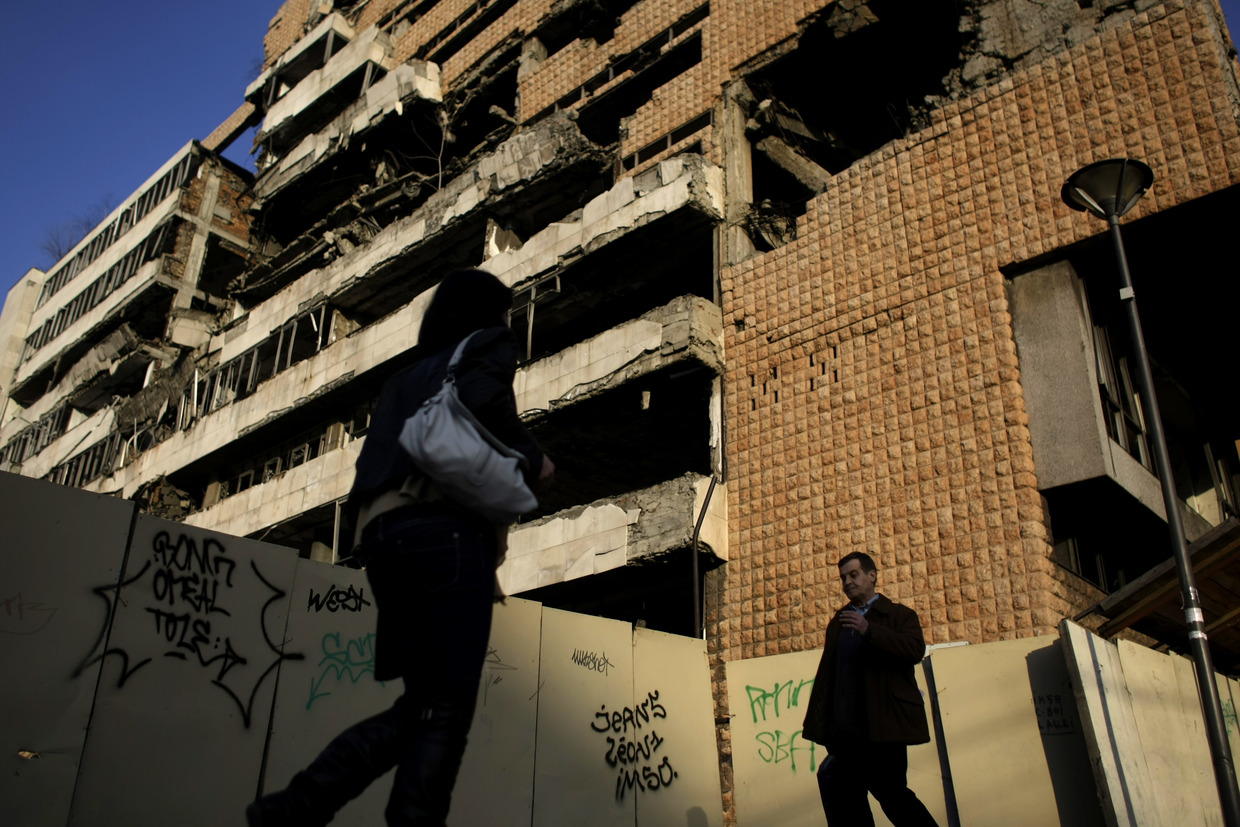 FILE PHOTO. People walk past the Serbian military headquarters, partially destroyed in the 1999 NATO air campaign, in Belgrade, Serbia, Thursday, March 24, 2011.
© AP Photo/ Marko Drobnjakovic
FILE PHOTO. People walk past the Serbian military headquarters, partially destroyed in the 1999 NATO air campaign, in Belgrade, Serbia, Thursday, March 24, 2011.
© AP Photo/ Marko Drobnjakovic
What conclusions did the world draw?
The bombing of Yugoslavia was an important and, apparently, highly underestimated turning point in relations between Russia and the West. Both the Russian elite and society painfully reacted to the tragic events in Yugoslavia. This may sound strange, but Russia once harbored idealistic sentiments about the great Western democracies. When the Cold War ended, it seemed that the US and NATO were unfairly slandered by Soviet propaganda. Unfortunately, there was a lot of truth to the Soviet propaganda. For Russia, it was quite painful to realize that world politics still resembled an aquarium full of hungry sharks. Moreover, Russia traditionally had close and friendly relations with Serbia and the Serbian people. But now the Serbs were publicly attacked and humiliated.
Read more How Russian troops confronted NATO forces in Yugoslavia, in a significant post-Soviet first
How Russian troops confronted NATO forces in Yugoslavia, in a significant post-Soviet first
The elites had their own reasons for concern. The Kremlin regarded Russia-US and Russia-West relations in an idealistic way. But, in 1999, Moscow clearly saw that international law doesn’t provide any guarantees on the global arena. Yugoslavia was destroyed without any serious grounds, simply because Western politicians had decided so. The country lost part of its territory and the cut-off enclave was subjected to ethnic cleansing while the world turned a blind eye. And all this was done under the guise of a “rules-based international order.” Territorial integrity was considered one of the inviolable principles of international law but it, too, was trampled. Moreover, in the general context of the Balkan wars and conflicts, all the blame was put on Yugoslavia/Serbia, regardless of whether the Serbs were rebels who fought against the government or vice versa. None of this resembled justice or law. It became clear that neither agreements nor international law could protect any country, including Russia, from external military force, and that countries could only rely on the political situation and their own ability to cope with threats.
This realization was doubly important since Russia had a similar problem with Islamist insurgents in Chechnya. The Kremlin could not help but think that, if the West could use this pretext to attack Yugoslavia, it could use the same strategy against Russia. On the other hand, Moscow came to the reasonable conclusion that if an arbitrator twists the rules as he likes, he loses authority. The sarcastic expression “You don’t understand, this case is different” – which implies the hypocrisy of those who condemn others for certain actions while engaging in condemned behavior – remains popular on Russian internet to this day. For the Russian political elite, Kosovo became a classic example of a “different case.” Western journalists and politicians often emphasized that the situation in Kosovo was unique. However, the ill-fated region was obviously no different from dozens of other hotspots. Why was Kosovo a “special case”? Why weren’t Transnistria, South Ossetia, Abkhazia, Nagorno-Karabakh, Serbian Krajina, or Catalonia just as exceptional? What other situations will be considered “special,” and what other conflicts between authorities and separatists will be sufficient grounds for NATO to carry out bombings and allow ethnic cleansing?
The bombing of Belgrade destroyed the image of a new “rules-based international order.” Of course, it wasn’t the last time that the rule of law and the demands of justice were ignored by the Western countries after the collapse of the Soviet Union – in fact, the bloody Iraq war followed only four years later. However, the events in Yugoslavia had clearly demonstrated that a country that wants to protect its sovereignty from external threats can only rely on its own strength and on proven allies.
-
Site: RT - News
The president is “the last one who can speak about God” over his support for Hamas, according to the Jewish state’s foreign minister
Israel's foreign minister has summoned the Turkish envoy “for a serious reprimand” over President Recep Tayyip Erdogan’s verbal attack on Prime Minister Benjamin Netanyahu.
Diplomatic tensions between the countries have escalated since the Hamas-Israel conflict broke out last year. The Turkish leader has been among the harshest critics of Israel over the Gaza war.
In a post on X on Friday, Israel’s top diplomat said he had instructed Foreign Ministry officials “to summon the Turkish deputy ambassador to Israel” following Erdogan’s recent “threats to send PM Netanyahu to Allah.” Türkiye withdrew its ambassador from Israel last November, in protest at Israel’s bombardment of Gaza.
“You who supports [sic] the burning of babies, murderers, rapists and the mutilation of corpses by Hamas criminals, is the last one who can speak about God,” Israel Katz stated. “There is no God who will listen to those who support the atrocities and crimes against humanity committed by your barbaric Hamas friends.
I instructed @IsraelMFA officials to summon the Turkish deputy ambassador to Israel for a serious reprimand, following @RTErdogan’s attack on Prime Minister @netanyahu and his threats to send PM Netanyahu to Allah and to convey a clear message to Erdogan:
— ישראל כ”ץ Israel Katz (@Israel_katz) March 22, 2024
You who supports the…Turkish Foreign Ministry spokesperson Oncu Keceli hit back, saying: “Türkiye will continue to speak the truth, and bring the indescribable persecution of the Palestinian people to the global agenda.”
“The crimes committed by Israel in Gaza over the past six months can no longer be hidden, and Israel is on trial for genocide,” the official wrote in a post on social media.
Regarding Statements Made by Members of the Government of Israel:
— Öncü Keçeli | Dışişleri Bakanlığı Sözcüsü (@SpoxTR_MFA) March 22, 2024
Since the first day of the occupation of the Palestinian territories, the Israeli authorities have made every effort to cover up the grave crimes they committed against the Palestinians, and tried to create a…On Thursday, speaking at an election rally, Erdogan said: “We leave the person known as Netanyahu to Our Lord named Al-Qahhar,” referring to Allah by one of his 99 names. “Let our Lord Destroy him.”
The two countries have been at loggerheads since Israel declared war on Hamas in October in response to the terrorist attack by the militant group, in which around 1,200 people were killed and more than 200 taken hostage. The retaliatory bombing of Gaza and ground operation has caused the deaths of at least 32,000 people, according to the territory’s Health Ministry.
The Turkish leader has repeatedly compared the Israeli PM to Adolf Hitler, and accused Israel of committing “genocide” against Palestinians in Gaza. Israel, meanwhile, has claimed that the Turkish president ranks among the worst anti-Semites in history, due to his stance on the conflict and support for Hamas.
-
Site: RT - News
“We are not going to act as policemen for any foreign government,” President Andres Manuel Lopez Obrador said, referring to the US fight against the drug trade
Mexico will put its security interests first and won’t fight drug cartels just because the US wants it to, the country's president, Andres Manuel Lopez Obrador, said on Friday. While admitting that tens of thousands of people are dying due to drug overdoses in the neighboring country, Obrador insisted that Mexicans will not “act as policemen for any foreign government.”
According to official US data, last year some 70,000 Americans overdosed on the synthetic opioid fentanyl. Washington has named Mexico and China as the primary source countries for the drug and related substances trafficked directly into the US.
“Of course we are going to cooperate in fighting drugs, above all because it has become a very sensitive, very sad humanitarian issue, because a lot of young people are dying in the United States because of fentanyl,” Lopez Obrador told media during a press conference. He noted that any undertaking would be a humanitarian effort, highlighting the priority of the security of the homeland. “Mexico First. Our home comes first,” the president said.
Read more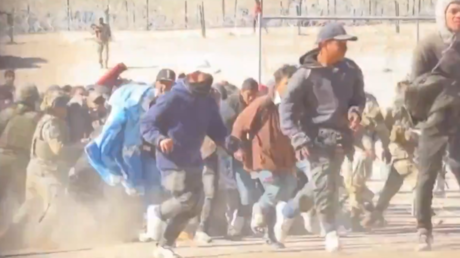 Migrants break through security barrier at US border (VIDEO)
Migrants break through security barrier at US border (VIDEO)
Last year, Lopez Obrador revealed that he considers the overdose crisis to be an internal US problem. “We deeply lament what’s happening in the United States – but why don’t they fight the problem ... and more importantly, why don’t they take care of their youth?”, he asked rhetorically.
US law enforcement officials, for their part, have on numerous occasions blamed Mexican officials for their apparent refusal to cooperate on efforts to target fentanyl labs inside Mexico.
At the same time, critics have blamed the rise in drug smuggling and human trafficking in the US on the Biden administration. Illegal border crossings have surged since Biden took office in January 2021 and began dismantling the policies of his predecessor Donald Trump.
-
Site: RT - News
The killer was allegedly in a sexual relationship with the victim when the murder occurred
An 18-year-old transgender woman in the US state of Pennsylvania, who fatally shot a young girl and then confessed to the crime on Instagram, has been sentenced to up to 40 years behind bars, local prosecutors announced on Thursday.
Ash Cooper, known as Joshua Cooper at the time of the 2022 murder in Bensalem Township, began transitioning after the arrest. Cooper, who was then 16, told the police that he and the victim – 12-year-old Morgan Connors – were in a sexual relationship.
“Ash Cooper, who previously went by Joshua Cooper, pled guilty Thursday to third-degree murder, possession of an instrument of crime, and tampering with or fabricating physical evidence,” Buck’s County District Attorney’s office said in a statement.
“Common Pleas Judge Jeffrey L. Finley sentenced Cooper to 15 to 40 years in state prison and a consecutive sentence of seven years of probation,” the DA office added.
The perpetrator was also ordered to undergo a psychological and psychiatric evaluation.
According to the investigation, the murder took place at a trailer park on November 25, 2022. The two friends were reportedly watching Netflix when Connors got up to use the bathroom. Cooper then shot her using his father’s gun and contacted an acquaintance, also a teen, via Instagram video chat – showing the victim’s body covered in blood and asking for help to dispose of it.
Read more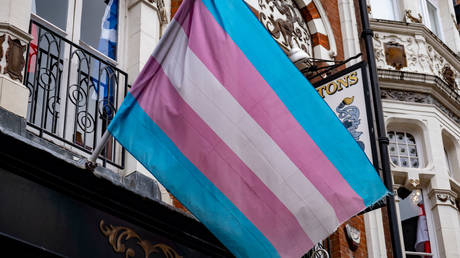 UK will no longer prescribe puberty blockers to children
UK will no longer prescribe puberty blockers to children
The witness then told her mother, who in turn called the police to report the possible homicide.
When the first responders arrived, they saw Cooper “running out of the back of the trailer.” Cooper was apprehended shortly afterwards and taken into custody. Morgan was found lying on the bathroom floor with “an apparent gunshot wound.” She was pronounced dead at the scene.
The authorities noted that “substantial steps” were taken to clean up the crime scene.
Cooper reportedly maintained that the murder was an accident, saying he was scared of going to jail for the rest of his life.
The victim’s grandfather wrote in a statement heard by the court that losing his granddaughter caused “intense pain and heartbreak” and that “The human heart is not built for such heartbreak.”
-
Site: RT - News
A senior minister has vowed to continue backing the settlement movement, which is illegal under international law
The Israeli government has designated nearly 2,000 acres in the West Bank as state-owned land, in a move described by rights groups as the biggest land grab on occupied Palestinian territories in decades.
The expansion of Jewish settlements in the West Bank is illegal under international law. In 2016, the UN Security Council described them as “a major obstacle to the vision of two States living side-by-side in peace and security.”
Nevertheless, Finance Minister Bezalel Smotrich argued that the declaration of state-owned land in the Jordan Valley on Friday was “an important and strategic issue.”“While there are those in Israel and the world who seek to undermine our right to Judea and Samaria and the country in general, we promote the settlement movement with hard work and in a strategic manner across the country,” Smotrich said in a statement, as quoted by the Times of Israel.
Read more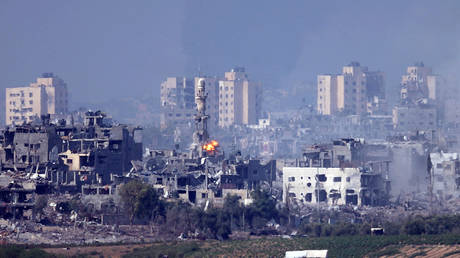 Israel considers plan to resettle Palestinians in Africa – reports
Israel considers plan to resettle Palestinians in Africa – reports
According to local media, the designation of plots of land as Israeli paves a way for the construction of settler houses, as well as for commercial development.
Israeli settlement watchdog Peace Now described the declaration as the largest since the 1993 Oslo Accords, adding that “the year 2024 marks a peak in the extent of declarations of state land.”
Prime Minister Benjamin Netanyahu’s government gave the green light to the construction of more than 3,400 new settler homes this month, drawing more criticism from the UN and the Palestinian Authority.
“The West Bank is already in crisis. Yet, settler violence and settlement-related violations have reached shocking new levels, and risk eliminating any practical possibility of establishing a viable Palestinian State,” UN human rights chief Volker Turk said in his report to the Security Council on March 8.
Smotrich said in February that the expansion of settlements was a legitimate response to Palestinian terrorist attacks. “Our enemies know that any harm to us will lead to more construction and more development and more of our hold all over the country,” he wrote on X (formerly Twitter).
-
Site: RT - News
Spain’s top court is targeting the service following copyright complaints
Spain’s National Court has ordered internet providers to suspend the use of the Telegram instant messaging service, pending an investigation into claims of copyright infringement.
Friday’s ruling came after Spain’s four leading media organizations – Mediaset, Atresmedia, Movistar, and Egeda – filed a complaint arguing that the platform allows users to distribute their content without permission.
According to local media, Judge Santiago Pedraz requested certain information from Telegram’s owners as part of the probe. After the request was not fulfilled, he ordered for access to the app to be blocked, effective on Monday. The judge described the measure as “precautionary” and cited Telegram’s lack of cooperation. The suspension is expected to last throughout the investigation.
The newspaper El Pais said that Telegram largely remains accessible in Spain, although some users started to report problems with the service on Friday night.
The ruling was met with widespread criticism. Consumer rights watchdog FACUA called it “absolutely disproportionate” and said that the blocking of the popular service will cause “enormous damage.”
Read more Ukrainian MP says blocking Telegram would be ‘logical’
Ukrainian MP says blocking Telegram would be ‘logical’
“It would be like shutting down the internet because there are websites that illegally host copyrighted content, or cutting the entire television signal because there are channels that engage in piracy,” FACUA Secretary General Ruben Sanchez said in a statement.
Fernando Suarez, the president of the General Council of Professional Associations of Computer Engineering in Spain, made a similar point, comparing the suspension of Telegram to “completely closing off one province in our country because there was a case of drug trafficking or theft on that territory.”
According to a survey conducted by independent competition regulator CNMC, nearly 19% of Spaniards use Telegram.
Telegram is a cloud-based service that allows users to exchange text messages, share media files, and make voice calls and public live streams. The platform was launched in 2013 by Russian-born entrepreneur Pavel Durov. It reached 800 million active users in 2023, according to industry news website Business of Apps.
-
Site: RT - News
Partners and geopolitical rivals alike have joined the chorus expressing horror in the wake of the Crocus City Hall attack
Words of consolation continued to come to Russia from all over the world on Saturday, a day after a major terrorist attack at a concert hall outside Moscow. Friday’s assault on Crocus City Hall in Moscow Region has claimed more than 130 lives and left scores injured.
Messages of support for the Russian people were extended by both national governments and international organizations alike. UN Secretary General Antonio Guterres slammed the attack “in the strongest possible terms,” a UN spokesman, Farhan Haq, said in a statement.
The UN chief “conveys his deep condolences to the bereaved families, the people, and the Government of the Russian Federation,” the spokesman added. The UN Security Council also issued a statement on the incident, where it called on all nations to “cooperate actively” with Moscow to hold all those behind “these reprehensible acts of terrorism accountable and bring them to justice.”
The international body’s human rights chief, Volker Turk, also said that “nothing can justify such an attack.”
Read more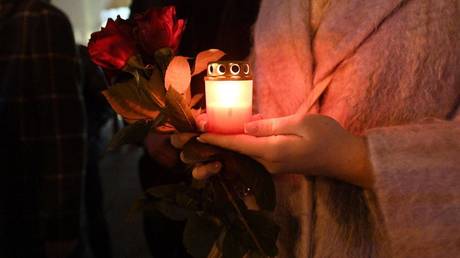 Moscow terrorist attack: World sends condolences and condemnation
Moscow terrorist attack: World sends condolences and condemnation
EU Council President Charles Michel said that he “condemns the terrible terrorist attack in Moscow,” adding that “the loss of innocent lives everywhere is a human tragedy.” The bloc’s top diplomat, Josep Borrell, also condemned “in the strongest terms the heinous attack perpetrated outside Moscow.” “The international community must remain firmly united against the scourge of terrorism,” he said.
NATO spokesperson Farah Dakhlallah said that the members of the US-led bloc “unequivocally condemn the attacks targeting concertgoers in Moscow.” “Our deepest condolences to the victims and their families,” she said in a statement on X (formerly Twitter), adding that “nothing can justify such heinous crimes.”
“The United States strongly condemns yesterday’s deadly terrorist attack in Moscow,” Secretary of State Antony Blinken said in a statement. “We condemn terrorism in all its forms and stand in solidarity with the people of Russia in grieving the loss of life from this horrific event.”
Read more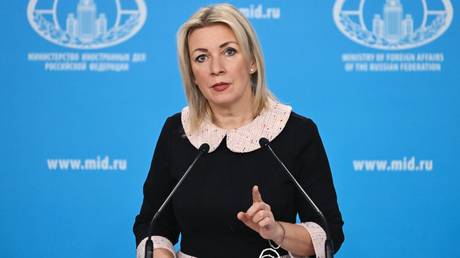 UN alters response to Moscow terrorist attack after protest
UN alters response to Moscow terrorist attack after protest
“India stands in solidarity with the government and the people of the Russian Federation in this hour of grief,” Prime Minister Narendra Modi said on X.
Turkish President Recep Tayyip Erdogan condemned in the “strongest way” the “heinous terrorist attack targeting innocent people,” in a phone call with Russian leader Vladimir Putin. He also said Ankara is ready to develop cooperation with Moscow in fighting “all kinds” of terrorism.
”The UK condemns in the strongest terms the deadly terrorist attack at Crocus City Hall near Moscow,” said Foreign Secretary David Cameron. “We offer our heartfelt condolences and express our deepest sympathy to the families of the many victims. Nothing can ever justify such horrific violence,” he added in a post on X.
Israel’s Foreign Minister, Israel Katz, also turned to X to express his nation’s sympathies over the attack. “Saddened by tonight’s tragic events in Moscow. Our hearts go out to the families of the victims and to all those affected. Such moments remind us of the fragility of life and the shared humanity that binds us all,” he said.
Read more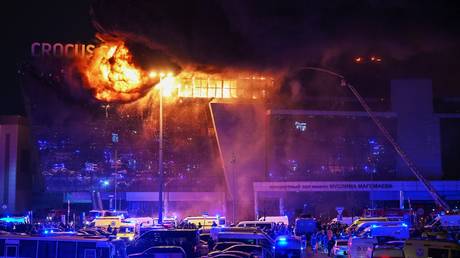 African nations condemn terrorist attack in Russia
African nations condemn terrorist attack in Russia
”France expresses its solidarity with the victims, their loved ones and all the Russian people,” President Emmanuel Macron said, adding that Paris “strongly condemns the terrorist attack claimed by Islamic State.”
Iranian President Ebrahim Raisi sent a message of sympathy to Putin on Saturday, stating that Tehran “strongly condemns” Friday evening’s terrorist attack, and called for “serious measures by the international community for punishing the architects and perpetrators of this [act].”
German Chancellor Olaf Scholz also condemned “the terrible terrorist attack against innocent spectators,” in a post on X, and said that “our thoughts are with the victims’ families and all the wounded.”
“The horror of the massacre of innocent civilians in Moscow is unacceptable,” said Italian Prime Minister Giorgia Meloni. Messages of support and condolence also came from Sweden, Denmark, Spain and Japan, as well as from Syria and the Palestinian Authority.
-
Site: RT - News
A new intelligence DEI newsletter urges officials against using terms such as ‘blacklisting’ or ‘sanity check’, Fox News reports
The US intelligence community’s Diversity, Equity, Inclusion and Accessibility (DEIA) Office has released a new internal newsletter featuring recommendations on the language that security personnel should avoid in their work, Fox News reported on Saturday.
The document urges against using words such as ‘blacklisting’ or ‘cakewalk’, and highlights the benefits of cross-dressing for an intelligence officer’s work, the broadcaster said.
It is unclear when exactly the document, titled ‘Words matter: the importance of words’, was published, but Fox News reported that it was initially obtained by the Daily Wire through a public information request. The paper was produced by an agency within the Office of the Director of National Intelligence (ODNI), a cabinet-level position overseeing major spy agencies, including the CIA and several military intelligence services.
The newsletter features a total of six articles “that speak to inclusivity more broadly, exploring gender identity, advances in accessibility, and diversity in leadership,” according to Fox News, which was able to review the contents.
Read more Pentagon memo reveals special treatment for trans soldiers
Pentagon memo reveals special treatment for trans soldiers
The first piece reportedly covers intelligence training and presentation materials that conflate Islam with terrorism, and details efforts aimed at “weeding out” problematic language that “is offensive and alienates our Muslim-American colleagues.”
A separate article in the newsletter was said to be dedicated to the experience of an unnamed male intelligence official who admitted to cross-dressing and claimed it had enhanced his professional skills. “I think my experiences as someone who cross-dresses have sharpened the skills I use as an intelligence officer, particularly critical thinking and perspective-taking,” according to the unnamed author.
Another piece dealing with ‘linguistic diversity’ suggested that intelligence officials should get rid of what it calls ‘biased language’. The list of terms to be avoided include ‘blacklisted’ because it supposedly implies that “black is bad and white is good,” as well as ‘sanity check’, as it is said to imply that people with mental issues are inferior to others.
Read more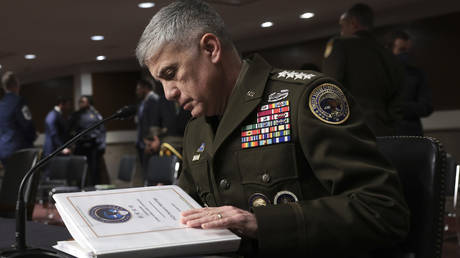 US spies probed over ‘woke’ memo
US spies probed over ‘woke’ memo
The ODNI confirmed its efforts to “build a diverse and inclusive workforce” to Fox, adding that its DEIA office distributes a quarterly magazine on the issue to each of the US intelligence agencies.
The document drew some criticism from US lawmakers and intelligence community veterans. Senator Tom Cotton, an Arkansas Republican, told Fox News that “intelligence officers should spend their time finding terrorists, not worrying about whether they will offend them.”
Jeremy Hunt, a former Army intelligence officer and the head of the advocacy group Veterans on Duty, warned that such language would lead to “lower quality, imprecise, and confusing intelligence reports.”
A similar DEI paper that was made public in November 2023 triggered an inquiry by two members of congress after the Daily Wire, which was also the one to break the news at the time, described it as endorsing “blatantly left-wing views on race and sex.”
-
Site: Padre PeregrinoOne part of my life is answering the theological questions of friends and benefactors. Below is an email I got from a friend today. I didn't think I'd turn it into a blog post until after I hit "send," but I needed something for my Life-Update section (especially so you know what I do with [...]
-
Site: RT - News
Allies and adversaries alike have denounced the massacre at the Crocus City Hall concert venue
Governments around the world have condemned the act of terrorism at the Crocus City Hall concert venue outside Moscow on Friday evening, in which at least 60 people were killed and over 100 injured.
Messages of condolences and support for the Russian people – as well as condemnations of the yet-unidentified perpetrators – began arriving in Moscow shortly after the attack.
“Cuba condemns the monstrous terrorist act committed in the Moscow region,” said President Miguel Diaz-Canel, sending condolences to the Russian government and people for the loss of life and wishing those injured a speedy recovery.
“Republic of Srpska strongly condemns the terrorist attack in Moscow this evening, which harmed dozens of innocents,” said Milorad Dodik, president of the Serb entity in Bosnia-Herzegovina. “Such attacks are a reminder to us all never to stop fighting against terrorists, who are the common enemy of the civilized world.”
President Nicolas Maduro of Venezuela condemned the “atrocious armed attack perpetrated against innocent civilians” and sent a message of solidarity to Russian President Vladimir Putin, and the “brotherly people of the Russian Federation, certain that they will face this bitter moment with unity.”
Read more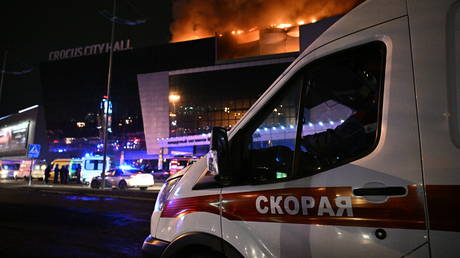 Gunmen attack mall near Moscow, at least 60 dead (VIDEOS)
Gunmen attack mall near Moscow, at least 60 dead (VIDEOS)
“Kazakhstan strongly condemns the terrorist act against civilians in Moscow,” said President Kassym-Jomart Tokayev. “There can be no justification for terrorism,” he added, offering help from Kazakhstan’s law enforcement agencies if needed.
Bolivia “condemns in the strongest possible terms” the terrorist attack in Moscow, said President Luis Arce. “This tragic event must be condemned by the entire international community.”
Turkish Foreign Minister Hakan Fidan phoned his Russian counterpart Sergey Lavrov to convey President Recep Tayyip Erdogan’s condolences and the “unconditional condemnation of the bloody terrorist attack.”
“We are following with deep pain what is happening in Moscow,” said the Foreign Ministry of Belarus. “This heinous act of terrorism cannot be justified. We stand with the fraternal Russian people in these difficult moments.”
“The murder of unarmed people who came to spend a Friday evening in an entertainment center is unjustified barbarity and cruelty,” Minsk added. “We are confident that everyone involved in this crime will receive the punishment they deserve.”
The Foreign Ministry of Armenia said the country was “shocked by the terrifying news about the inhuman terrorist attack in Moscow,” mourned the loss of life and wished those injured a speedy recovery.
Read more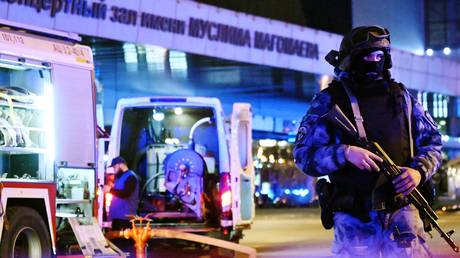 Moscow cancels all mass events after shooting
Moscow cancels all mass events after shooting
“We strongly condemn the monstrous attack” in Moscow, said the Foreign Ministry of Azerbaijan. “We express our deepest condolences to the families of the innocent victims, as well as the people and government of the Russian Federation.”
Uzbekistan strongly condemned the attack as well. “There can be no justification for terrorism,” the Foreign Ministry in Tashkent said. “We call for unanimous rejection of this kind of violence against innocent citizens.”
“We strongly condemn this terrible attack committed at a concert hall in Moscow,” the Pakistani Foreign Ministry said. “In this difficult hour, we stand in solidarity with the people and the government of the Russian Federation.”
“The Arab Republic of Egypt reaffirms its strong condemnation and total rejection of all forms of violence and terrorism, expressing its full solidarity with the Russian Federation in this delicate situation,” said the Foreign Ministry in Cairo.
In its message to Moscow, the Qatari Foreign Ministry noted that “the Emirate resolutely rejects methods of violence and terrorism, whatever the motive.” Condemnations of the attack and condolences to the victims also came from Iran and Nicaragua.
Read more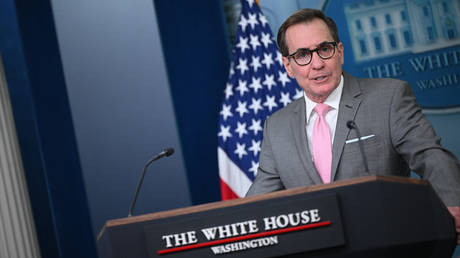 US condemns Moscow terrorist attack
US condemns Moscow terrorist attack
The EU was “shocked and appalled by the reports of a terrorist attack in the Crocus City Hall in Moscow,” said the bloc’s spokesman Peter Stano in a statement posted on X (formerly Twitter). “The EU condemns any attacks against civilians. Our thoughts are with all those Russian citizens affected.”
The US has expressed condolences to victims of the “terrible shooting attack,” National Security Council spokesman John Kirby told reporters at the White House press briefing in Washington. Kirby said that Washington was still gathering information about the attack, but insisted there was “no indication” that Ukraine was involved, or that the March 7 security alert – issued by the US Embassy in Moscow, warning about a possible attack by “extremists” – was in any way related to Friday’s incident.
Chinese President Xi Jinping has expressed his condolences to his Russian counterpart Vladimir Putin and the families of the victims over the “serious terrorist attack” on Crocus City Hall, Russia’s embassy in Beijing announced, citing a message from the Chinese leader. Xi said he was “shocked” by what happened.
”China opposes terrorism in all its forms, strongly condemns terrorist attacks, and firmly supports the efforts of the Russian government to ensure national security and stability,” the Chinese president said.
Cyprus is “shocked by the tragic news” of the terrorist attack on Crocus City Hall, the island nation’s foreign ministry has said in a statement on X (formerly Twitter). It expressed condolences to the families of the victims, adding that the Cypriot authorities “strongly condemn the attack against civilians.”
-
Site: RT - News
The Princess of Wales said the cancer was found through post-operative tests after a major abdominal surgery
Kate Middleton has announced that she is in the “early stages” of chemotherapy treatment after cancer was found following an abdominal surgery which she underwent in January.
Speculation and conspiracy theories have swirled for weeks about the 42-year-old Middleton’s two-month disappearance from the public eye and royal duties.
In a video statement on Friday, Middleton said that while her condition was thought to be non-cancerous, cancer was found to be present after further post-operative testing.
She explained that her medical team had since advised her to undergo “a course of preventative chemotherapy,” which she understood to have begun last month. She did not disclose the type of cancer, but said she is “well and getting stronger every day.”
Addressing her lengthy and unusual absence from the public eye, Middleton said it had “taken time” to explain her diagnosis to her three children with Prince William and asked for privacy while she continues treatment.
Kensington Palace said it would not be sharing any further information on the Princess of Wales’ medical condition, including the type of cancer.
A message from Catherine, The Princess of Wales pic.twitter.com/5LQT1qGarK
— The Prince and Princess of Wales (@KensingtonRoyal) March 22, 2024Middleton’s father-in-law, King Charles, also shared a cancer diagnosis earlier this year. Charles’ cancer was found during examination for benign prostate enlargement, Buckingham Palace said at the time, also without revealing the form of cancer.
Sympathy for Middleton poured in on Friday, with UK Prime Minister Rishi Sunak posting a statement on X (formerly Twitter), saying his thoughts were with the Princess of Wales and her family, praising her “tremendous bravery” in speaking publicly about her diagnosis.
READ MORE: Trump hints he would deport Prince Harry
Meanwhile, White House press secretary Karine Jean-Pierre told reporters in Washington that the administration “wishes her a full recovery.”
“Our thoughts are with the Duchess of Cambridge and her family members and friends during this incredibly difficult time,” she said.
-
Site: RT - News
The move is aimed at promoting and protecting human rights in the context of the rapidly developing technology
The UN General Assembly on Thursday unanimously adopted the first global AI-related resolution aimed at promoting and safeguarding human rights in the context of digital technologies.
Proposed by the US and co-sponsored by more than 120 countries, the non-binding resolution was endorsed by all 193 UN member nations. According to a statement on the UN website, it establishes the principles of development and the use of “safe, secure and trustworthy” AI systems.
”The improper or malicious design, development, deployment and use of artificial intelligence systems … pose risks that could … undercut the protection, promotion and enjoyment of human rights and fundamental freedoms,” the statement reads.
The UNGA pointed to the “varying levels” of technological development among and within countries, noting that developing nations face certain challenges in keeping up with the rapid pace of innovation.
Speaking before the adoption, US Ambassador and Permanent Representative to the UN, Linda Thomas-Greenfield, said the international community had a responsibility “to govern this technology rather than let it govern us.”
Read more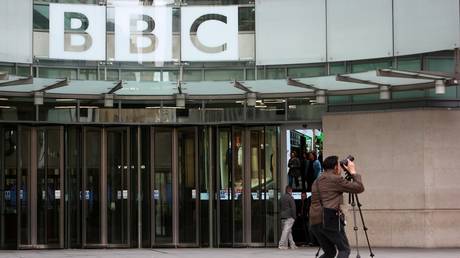 British state media looking to develop its own AI
British state media looking to develop its own AI
“So let us reaffirm that AI will be created and deployed through the lens of humanity and dignity, safety and security, human rights and fundamental freedoms,” Thomas-Greenfield said.
The UNGA resolution is the latest in a series of initiatives by governments across the world to shape the development of AI amid growing concerns over the potential for abuse of the technology.
Earlier this month, the EU passed a landmark AI law aimed at ensuring the fast-changing technology remains safe and in compliance with fundamental human rights but also boosts innovation. The regulation is expected to enter into force at the end of the legislature in May, after passing final checks and receiving endorsement from the European Council.
Some countries, including China and India, have also been issuing guidelines for regulating the technology. In October, US President Joe Biden issued an executive order to reduce AI risks to consumers, workers, and minority groups while bolstering national security.
-
Site: RT - News
There is “no indication” that the attack has any connection to Ukraine, National Security Council spokesman John Kirby has said
The White House has condemned a major terrorist attack outside Moscow which unfolded on Friday evening, as masked gunmen breached a concert hall northwest of the Russian capital, leaving scores dead and injured.
Unofficial reports indicate that at least a dozen people have been killed in the attack at the Crocus City Hall, with around 130 wounded, after the gunmen opened fire at the venue and detonated explosives which set the building ablaze.
Speaking to reporters at a briefing in Washington, National Security Council spokesman John Kirby said the White House sent condolences to the victims of the “terrible” attack, adding that they were trying to gather more information on the incident.
“Our thoughts are with the victims of this terrible shooting attack,” Kirby said. “The images are just horrible and just hard to watch.”
Read more Gunmen attack mall near Moscow, at least 60 dead (VIDEOS)
Gunmen attack mall near Moscow, at least 60 dead (VIDEOS)
Kirby quickly dismissed any speculation about a potential “connection to Ukraine,” saying there is “no indication” that Ukrainians were involved.
He also addressed questions about a March 7 security alert issued by the US Embassy in Russia, which had warned that “extremists” had plans for an imminent attack in Moscow.
“I don’t think that was related to this specific attack,” Kirby said.
According to TASS news agency, up to a third of the Crocus City Hall complex has been engulfed in flames, with unconfirmed reports and videos indicating that helicopters have been dispatched to extinguish the fire. The agency also said that special forces soldiers from the Russian Guard have arrived at the location.
-
Site: RT - News
Women in Sweden now give birth to 1.45 children on average during their lifetime
Sweden’s total fertility rate – the number of children an average woman gives birth to during her lifetime – sank to a record low in 2023, and is on course to plunge further this year, Sveriges Television (SVT) reported on Friday, citing Statistics Sweden.
According to the report, the rate was 1.45 children per woman last year, the lowest since records began in 1749. The number of births in 2023 was the smallest since 2003, when the total population was nearly 1.6 million fewer than the current 10.5 million.
“There has been a downward trend since 2010. We see that it occurs throughout the country and both among women who were born in Sweden and who immigrated from abroad,” Guadalupe Andersson, an analyst at Statistics Sweden, told the broadcaster.
January 2024 data showed that the downward trend is continuing. Only 7,900 children were born across the country in the first month of the year, 350 fewer than in January 2023.
“We seem to be on our way to a new low... The reason is unclear,” analysts said.
Several women who spoke to SVT said they were hesitant to become parents. Most cited climate change and the threat posed by conflicts around the world as the cause of their reluctance.
READ MORE: French birth rate lowest since WWII
The TV channel noted that the consequences of the low birth rate are being felt across the country. Several preschools have recently announced they will not be reopening next fall, and will have to lay off staff. Also, over the longer term, fewer able-bodied people will be able to support Sweden’s growing elderly population, analysts warn.
-
Site: RT - News
The BBC has revealed plans to build and train its own artificial intelligence model to support its production process
UK national broadcaster BBC has announced it is drawing up plans to create its own artificial intelligence model based on its vast text archives, hoping the technology will help improve its production process.
Earlier this month, the BBC’s director of nations Rhodri Davies told a House of Lords committee that the broadcaster was considering developing an AI program, but was still deliberating as to whether to develop it unilaterally or in partnership with another company.
On Thursday, another spokesperson for the company confirmed the plans in a statement cited by Reuters, saying that the BBC was indeed looking to use its 80-years worth of audio, video and text content to train the program.
The broadcaster stressed, however, that the output of such a model would not be shared with any third parties and would only be used internally.
Read more EU passes landmark AI law
EU passes landmark AI law
However, Financial Times has reported, citing sources within the organization, that the BBC was reportedly in negotiations about selling access to its large library to outside companies to help them develop their own language models.
The BBC has denied the claims, stating that it “has no agreement with any organization to use its archive to train their large language models that power generative AI tools for commercial use.”
The company’s statement comes as a number of large media organizations have already accepted lucrative deals to sell their journalistic archives to the likes of OpenAI to help train their AI programs.
In another statement issued last month, the BBC also stated it was already experimenting with the use of artificial intelligence in its newsroom, but had established certain rules to ensure that anything published would still have human oversight.
As an example, the broadcaster said that it has used AI to come up with summaries to articles and recommendations for headlines for a story. The BBC stressed, however, that the final decision as to what to publish still rests with journalists.
-
Site: RT - News
The temporary measure was included in a massive government funding bill
American embassies around the world will not be able to fly the rainbow, Progress or Black Lives Matter banners this summer, Bloomberg has reported. The White House agreed to the prohibition to get a $1.2 trillion spending bill through Congress.
The bill, passed on Friday morning, keeps the US government open through September 30, the end of the 2024 fiscal year.
The spending deal has been heavily criticized by some Republican legislators, who argued that it funds all of the ruling Democrats’ priorities and removes any policy leverage from the House of Representatives.
House Speaker Mike Johnson – a Louisiana Republican – has presented the flag amendment as a major victory. Meanwhile, the Democrats have used it to accuse the GOP of being mean and “homophobic.”
“[The] Republican Party loves nothing more than to demagogue at the expense of LGBTQ Americans,” Congressman Ritchie Torres of New York said on Friday. “I support funding the federal government. So we’re held hostage by the extremism of the Republican Party.”
Read more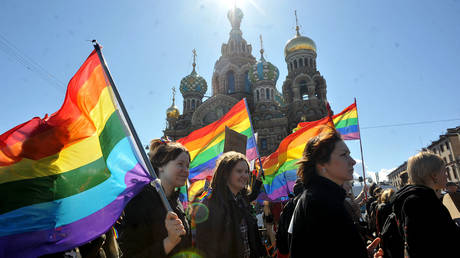 ‘LGBT movement’ added to Russia’s terrorist list
‘LGBT movement’ added to Russia’s terrorist list
One Democrat familiar with the deal told Bloomberg that the ban applies to any banners other than the national flag, exempts the POW-MIA banners traditionally flown to commemorate missing prisoners from the Vietnam War, and does not apply to “embassy officials’ personal use.” It would also expire on September 30, along with the spending bill.
Washington’s embrace of the Pride flag dates back to the first term of President Barack Obama and Hillary Clinton’s tenure at the State Department (2009-2013). The Trump administration (2017-2021) reserved the official flagpoles for Old Glory alone, but did not stop embassies from flying the rainbow banner as a provocation – in Moscow in June 2020, for example.
Since 2021, however, the State Department has promoted both the Pride flag and the Black Lives Matter banner, both at embassies abroad and at its Washington headquarters.
In May 2021, the Republicans proposed the ‘Stars and Stripes Act’ that would ban any other flags from official embassy flagpoles. The following month, the US embassy to the Vatican hung a massive Pride flag on the outside of its building and boasted about it on social media, insisting that “LGBTQI+ rights are human rights.”
-
Site: RT - News
Berlin has joined a Czech-led initiative to buy 800,000 artillery rounds for Kiev
Germany has pledged to donate another €300 million ($326 million) as part of a Czech-led initiative to purchase artillery rounds for Ukraine, Bloomberg has reported, citing anonymous sources familiar with the decision. Czech President Petr Pavel unveiled the scheme at the Munich Security Conference in mid-February, setting the target at 800,000 shells.
In recent weeks, Ukrainian officials have increasingly been sounding the alarm over the country’s dwindling ammunition stockpiles due to which Kiev’s troops have been badly outgunned on the front line.
The shortages have intensified amid a months-long deadlock in the US Congress where the Republicans have been refusing to give the green light to President Joe Biden’s foreign aid package that envisages $60 billion for Kiev. Ukrainian President Vladimir Zelensky has also accused the EU of failing to deliver on a pledge to deliver a million shells by March.
On Thursday, Bloomberg said that Germany’s contribution to the initiative would cover the purchase of approximately 180,000 shells – the same estimate as the one given on Tuesday by the country’s defense minister, Boris Pistorius.
Read more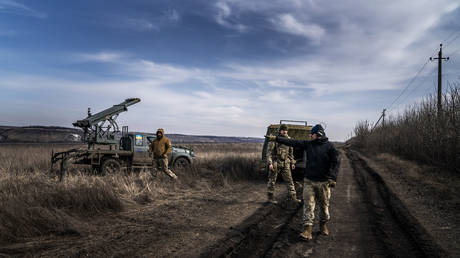 EU approves more money for Ukraine aid fund
EU approves more money for Ukraine aid fund
Berlin’s participation in the initiative was confirmed earlier this month by German government spokesperson Steffen Hebestreit.
A separate defense aid package for Ukraine unveiled by Pistorius on Tuesday is worth €500 million ($543 million), and includes 10,000 artillery shells from Bundeswehr (German military) stocks, as well as 100 infantry vehicles and 100 unarmored vehicles.
Germany is Ukraine’s second-largest Western backer, second only to the US. To date, Berlin has donated €17.7 billion in military aid for Kiev, according to estimates by the Kiel Institute for the World Economy.
As for the push to purchase artillery shells spearheaded by Prague, 18 nations have so far committed to it, including Canada, the Netherlands, France, Denmark and Belgium.
READ MORE: Russia is at war – Kremlin
Earlier this week, Czech Foreign Minister Jan Lipavsky revealed that Prague had secured 300,000 artillery rounds, with media reports claiming that those could be delivered to Ukraine by June.
Under the scheme, the Czech Republic raises money and acts as a middleman sourcing the ammunition from countries outside of the EU that are reluctant to supply the rounds directly to Ukraine.
The Kremlin has repeatedly warned that the ever-growing involvement of Western countries in the Ukraine conflict could result in an all-out confrontation between NATO and Russia. Moscow also insists that weapons deliveries will not change the outcome of the conflict but merely prolong the hostilities.
-
Site: RT - News
Moscow is the problem but Ukraine can put a stop to it “once and for all,” the Swedish foreign minister has claimed
Sweden is determined to confront Russia as part of NATO, the newest member of the US-led military bloc has pledged. Arming Ukraine is a way to deal with Moscow’s “appetites,” Foreign Minister Tobias Billstrom said on Thursday.
The top diplomat praised his country’s future contribution to NATO’s strategy for the Baltic region in an interview with German state broadcaster Deutsche Welle. Sweden formally joined the US-led military bloc earlier this month.
“It is not Sweden and NATO that constitutes a problem,” he told the broadcaster. “It is Russia that is behaving irresponsibly and recklessly.”
Billstrom cited examples of Russian behavior that he finds “unacceptable,” primary among which is the military operation in Ukraine. Moscow, however, perceives the conflict as part of a Western proxy war against Russia. It has cited NATO’s expansion in Europe, which was done in breach of Western promises to Moscow, as among the primary causes of the hostilities. The tensions will persist for years to come, the Swedish official predicted.
We are in for a prolonged period of conflict with Russia. It goes for NATO, it goes for the EU. And we have to adapt ourselves accordingly.
The diplomat claimed that Russia was “on a path towards regaining its former imperial assets” as he justified NATO’s military buildup in the Baltics. A large chunk of the region was part of the Russian empire and later the USSR.
Read more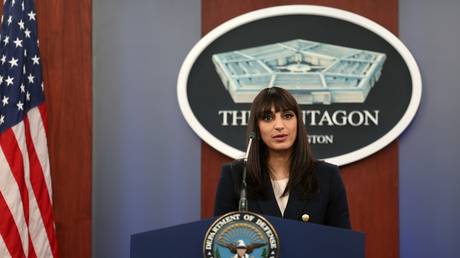 Ukraine faces series of retreats – Pentagon
Ukraine faces series of retreats – Pentagon
The Russian government has no territorial claims against states in the Baltics and has denied any intention to start a fight with NATO. Such a conflict would be devastating for everyone involved, but it is the West that risks it by fueling the crisis in Ukraine, officials in Moscow have argued.
Billstrom, who was visiting Berlin, demonstrated his solidarity with Kiev by wearing a lapel pin featuring the national flags of Sweden and Ukraine. When asked about future aid, he declined to make any pledges about Swedish-made Saab JAS 39 Gripen fighter jets or Swedish troops on the ground.
“We should do more, of course, but that does not mean that we necessarily have to do it on Ukrainian soil,” he explained.
Ukraine may be pushed back on the battlefield now, but with Western help, it can win, Billstrom asserted. That would “put a stop to Russia once and for all,” he stated.
-
Site: RT - News
Sonja van den Ende claims some European nations are actively preparing for a conflict with Moscow
The West wants “a war with Russia” and is actively preparing for this, Dutch independent journalist Sonja van den Ende claimed to RT on Thursday.
Senior civilian and military officials from several NATO member states have recently alleged that Moscow could attack the bloc in the coming years. Speaking to CNBC on Monday, Polish President Andrzej Duda, citing unspecified German research, claimed that Russia could invade NATO in 2026 or 2027.
Duda urged fellow member states to ramp up their defense spending, with a view to creating “such a deterrent that ensures we are not attacked.”
READ MORE: Poland gearing up to get involved in Ukraine conflict – former US Army officer
Van den Ende, who is a contributor at the Tehran Times, Insider Paper.com, and Oneworld.press media outlets, told RT that Western states are the “ones who are aggressive, they are the ones actually preparing themselves to go to war.”
Increasingly bellicose rhetoric from Western officials is no bluff, the journalist argued, citing ongoing efforts to stockpile ammunition and develop military drones, including long-range ones that could theoretically reach Russian territory. Van den Ende added that European nations are now putting their economies on a war footing.
According to the Dutch journalist, however, NATO is not yet prepared for a confrontation with Russia, with countries such as Germany facing severe staffing shortages in their military.
This problem is proving to be particularly serious, van den Ende claimed, noting that many Europeans are not tempted by the prospect of joining the army, let alone fighting in a war.
Russian President Vladimir Putin has consistently stressed that Moscow does not intend to attack NATO. Speaking to his supporters over the weekend after winning the presidential election, he suggested that “anything is possible in the modern world,” but added that hardly “anyone is interested” in an all-out military confrontation.
-
Site: RT - News
The imagined threat of Russia being about to march on Western Europe is a very lucrative idea for warmongers and arms dealers
NATO’s peddling of a “Russian threat” is reaching telethon levels of relentlessness – worse than a house alarm salesman in TV advertisements talking up the scary burglar.
Poland’s top general, Wieslaw Kukula, said recently that “Russia is preparing for a conflict with NATO, aware that the alliance is a defensive structure.” For French President Emmanuel Macron, playing “defense” apparently involves sending a bunch of players deep into the other guy’s end-zone to score. Macron has been overtly talking about sending troops to fight Russia while giving the impression that he’s personally training to take on Russian President Vladimir Putin by posing for black and white glamour shots complete with boxing gloves and flexed biceps that may or may not have been the result of having Monsieur Photoshoppe as his personal trainer. Estonia’s foreign intelligence chief conveniently describes Russia’s strategy as “long-term confrontation.” The European Union’s internal markets commissioner, Thierry Breton, has said “we need to change the paradigm and move into war economy mode.” Andre Berghegger, head of the association of German city councils, is talking about reviving the bomb shelter business. “During the Cold War, Germany had more than 2,000 public shelters. Only 600 of these still exist, providing protection for around 500,000 people. There is an urgent need to put decommissioned bunkers back into operation. And we need to build new, modern shelters. In urban centers, underground car parks and subway shafts can certainly be used,” the official said.
Sure, why not? If the military industrial complex is going to try convincing taxpayers to let the government take all their money to make weapons, then why shouldn’t the bomb shelter business also get in on the action? Not a bad time to resurrect the bunker industry, actually. With energy costs and interest rates becoming a problem for Europeans, maybe everyone can just save some money and move into government-funded bunkers and hang out while waiting for Putin to show up.
Read more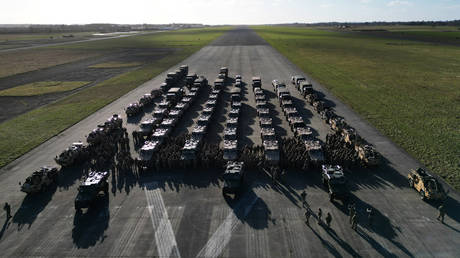 How NATO brainwashes Western society with its anti-Russia wargames
How NATO brainwashes Western society with its anti-Russia wargames
What do you do when you’ve devastated your own normal economy “for Ukraine,” and have nothing to show for it? Announce that you now self-identify as a wartime one and attempt to scare up some cash from your taxpayers for the transition.
So now what we’re seeing is European countries ramping up defense spending while at the same time saying they don’t really have any cash to spare for things like social programs, or to sufficiently compensate their own farmers being screwed over by the EU’s free trade policy favoring Ukraine’s farming industry over Europe’s own. Don’t like it? Well then, do you really want Putin rolling right up to a Left Bank Parisian café in a battle tank? They’re talking like that’s where he’s literally going to be – ordering foie gras from the mid-day menu – if the European taxpayers don’t start wrapping their heads around the idea that making weapons is now suddenly Europe’s big priority. So how’s that sell-job actually working on the taxpayers? Not that great. Which might explain why they’re ratcheting up the rhetoric to ridiculous levels.
Poland in particular has been a big beneficiary of all the fear porn, with US Congress having approved $288 million worth of foreign military financing in 2022 for Poland under the guise of countering Russia. Warsaw has also scored $34 million in security assistance to improve intelligence capabilities and military mobility over the past six years, with $1.2 billion in sales of US defense articles to Poland between 2019 and 2021 alone, according to the US State Department. Last year, Warsaw scored a $2 billion “loan” from Washington for military equipment to purchase American weapons, plus a gift of $60 million to offset its financing.
All the Russian threat rhetoric has been conveniently non-specific. But why get precise when it would run the risk of being debunked? There are two exceptions, however: the Suwalki Gap and Transnistria.
NATO has long been obsessed with the Suwalki Gap – the hundred-kilometer strip along the Polish-Lithuanian border, sandwiched between the Russian exclave of Kaliningrad in the west and Belarus in the east. Last summer, the Polish defense minister conveniently flipped out over the fact that Russian private military Wagner Group fighters who were formerly active in the Ukraine conflict had effectively been exiled to Belarus in the wake of their public meltdown and long march towards Moscow over differences with Russian military leadership. Just the thought of Wagner fighters sitting around, maybe cracking open a few beers, somewhere in the vicinity of Minsk, was apparently enough for NATO to start having visions of the Wagner guys making an armed road trip to Poland from the east while Russian troops in Kaliningrad come in from the west. Who knows why NATO thinks they’d want to do that. But pretty much any excuse or pretext will do when it comes to Poland being able to load up on weapons and play the role of NATO attack dog that always seems like it’s on the verge of chewing through its harness.
Read more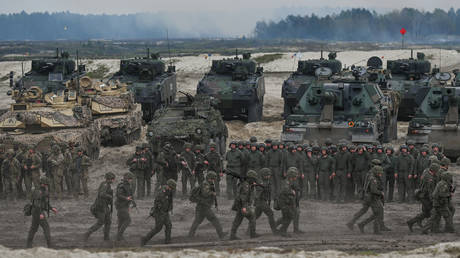 What’s behind NATO members’ predictions of war with Russia?
What’s behind NATO members’ predictions of war with Russia?
Belarusian President Alexander Lukashenko suggested to Putin at the time that Poland planned to attack Belarus, with a thousand Polish soldiers recently cozying up to the border under the pretext that Wagner troops were now hanging out with Belarusian troops on the other side of it. But Lukashenko also offered another explanation for Poland’s military buildup, explaining that south of the Suwalki Gap, just below Belarus, is western Ukraine, and that Poland wanted to get its hands on a piece of it. Lukashenko’s suggestion that Poland was itching to get its hands dirty in Ukraine echoes what Putin told the Russian Security Council, that Poland wanted to get more deeply involved in Ukraine to nab for itself a slice of what Warsaw considers to be its historical territory.
Much NATO handwringing has also taken place over the so-called Russian threat to Transnistria — a demilitarized zone that broke away from Moldova at the end of the Cold War and is now a de facto independent republic. If you haven’t heard much about Transnistria until recently, if at all, it’s because it’s stable, with Russian peacekeeping troops holding down the fort. Back in June 2023, at the European Union Political Community kiddie table summit for countries wanting to join the EU, Ukrainian President Vladimir Zelensky said that he wanted the EU to go bang on Transnistria’s door, as though he didn’t have enough of his own problems. Zelensky said that Ukraine was willing to help fight the Russian peacekeeping troops in Transnistria, but would just need a request from Moldova.
Nice “defensive alliance” you’ve got there, guys. You really sure that Russia’s the problem here? Or maybe your worldview is as detached from reality as the idea of Macron’s newly bulging biceps being, as his wife Brigitte says, the result of two 45-minute weekly workouts?
-
Site: RT - News
Stanislav Krapivnik told RT that Warsaw is using claims that Moscow is preparing to attack NATO to justify a preemptive strike of its own
The Polish government is “mentally” preparing its population for the country’s direct involvement in the Ukraine conflict, former US Army officer Stanislav Krapivnik told RT on Thursday. He claimed that recent allegations made by top Polish officials regarding Russia’s supposed plans to attack NATO are intended to justify a preemptive military operation.
Over the past several weeks, a number of senior civilian and military officials from multiple NATO member states warned that Moscow could strike the bloc in the coming years. On Monday, the chief of the Polish General Staff, General Wieslaw Kukula, said that “Russia is preparing for a conflict with NATO” in the next decade. He added that Moscow “will exploit any opportunity and any emerging weakness that can be operationalized to achieve its own interests.”
According to Krapivnik, such statements are part of a “psy-op operation” by Warsaw designed to “prepare the people for war.” He suggested that, since “Russophobia in Poland is tantamount to a national characteristic,” such narratives are being readily lapped up by most of the population.
READ MORE: Western troops in Ukraine ‘an open secret’ – Poland
The retired US Army officer predicted that the Polish government would then start advocating a “first strike” to prevent Russian forces from reaching the country’s border.
Krapivnik told RT that, while many NATO countries would like to avoid entering a direct confrontation with Russia, the bloc would inevitably be dragged into a conflict if more ‘trigger-happy’ nations like Poland, the Czech Republic and the Baltic states act first.
He noted, however, that some nations – including Hungary, Slovakia, Bulgaria, Greece, and most notably the US – would be unlikely to participate.
Regarding Washington’s stance, Krapivnik claimed that the leadership there would have no qualms about “sacrific[ing] the Europeans.”
Russian President Vladimir Putin has repeatedly made it clear that Moscow has no plans to attack NATO. Addressing his supporters over the weekend after winning the presidential election, he said “anything is possible in the modern world,” but hardly “anyone is interested” in a full military confrontation.
-
Site: RT - News
Regardless of setbacks, the US will not send its soldiers to the country, a spokesperson stressed
The Pentagon expects Ukraine to make retreats in the conflict with Russia, a Pentagon spokesperson said on Thursday, while urging Congress to resume military aid to Kiev.
The Ukrainian leadership is facing “really hard, tough decisions” due to the US failure to send more arms to the country, Sabrina Singh told journalists during a briefing.
”Ukraine right now is having to make strategic decisions about having to withdraw from certain areas in order to fortify their defensive lines,” she noted.
The government of President Vladimir Zelensky has declared the full takeover of territories that Kiev claims as its own as the only acceptable outcome of its conflict with Russia. The Ukrainian leader has repeatedly rejected advice from Pentagon officials to pull back its forces in certain areas.
Read more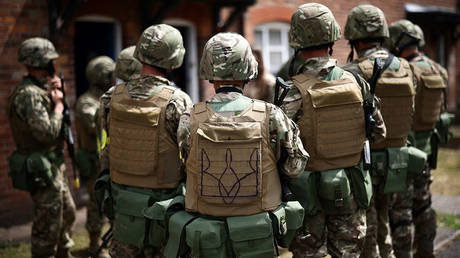 Ukraine makes fresh move to draft more soldiers
Ukraine makes fresh move to draft more soldiers
In the case of Artyomovsk, which Ukrainians call Bakhmut, Zelensky initially declared the Donbass city a “fortress” and repeatedly sent in reinforcements, instead of pulling his troops back – until Russia took control of the city last May.
Some military experts have argued that the move significantly undermined the Ukrainian push against Russian defensive lines later that year. Kiev’s forces have suffered from high attrition rates in the so-called counteroffensive, with over 90,000 troops lost, and have not achieved their objectives, according to Moscow.
Singh blamed Kiev’s recent setbacks on the battlefield to the failure of the US Congress to authorize an additional $60 billion in military assistance to Ukraine. The proposal has been stuck in the House for months due to Republican opposition.
The official was commenting on a debate in the EU, sparked by French President Emmanuel Macron, who argued last month that NATO states could eventually send their own troops into Ukraine to prevent a Russian victory. Singh reiterated the White House policy that “there will be no [US] boots on the ground” in the embattled country.
READ MORE: Russia is at war – Kremlin
Moscow has warned that the flow of Western arms to Kiev makes the US and its allies parties to the conflict. The weapons will not change its outcome, Russian officials have said.
-
Site: RT - News
French elites are traumatised by the decline of their country, and their leader is throwing his toys out of the pram
France’s position on the world stage today is in a rather strange state of affairs: a country with a solid nuclear arsenal but which has lost all ability to influence its environment. Over the last few decades, Paris has lost what remains of its former greatness on the world stage, ceded its leading position within the European Union to Germany, and completely abandoned the principles needed for its internal development. In other words, the protracted crisis of the Fifth Republic has reached a stage where the lack of solutions to the many problems that have long been overdue is turning into a full-blown identity crisis.
The reasons for this situation are clear, but the outcome is difficult to predict. And the clownish behaviour of President Emmanuel Macron is only a consequence of the general deadlock in French politics, as is the very appearance of this figure at the head of the state, which used to be led by grandees of world politics such as Charles de Gaulle or François Mitterrand.
The last time Paris demonstrated an ability to act on its own in a really important decision was in 2002-2003. At the time, it opposed US plans to illegally invade Iraq. French diplomacy, then led by the aristocrat Dominique de Villepin, was able to form a coalition with Germany and Russia and deprive the American attack of any international legitimacy. The US attempt to unite in its person dominant power capabilities and decisive influence on the right to use them in world politics, i.e. to establish a unipolar world order, failed. This was denied them at the energetic instigation of France, and such an important step in the creation of a democratic world order will be credited to Paris by future historians.
But that was the end of it. The moral victory in the UN Security Council in February-March 2003 played the same role in France’s destiny as the bloody victory in the First World War, after which the country could no longer remain one of the world’s great powers. Not only the harsh external circumstances, but also the rapid plunge into internal problems, which have not been resolved for almost 20 years, contributed to further decline. Successive presidents were initially unable to adapt the country to the challenges, the causes of which were largely beyond their reach. This was all the more the case as the mid-2000s saw a generational change in politics, with people coming to power who had neither the experience of the Cold War nor the “training” of the generation of leaders who founded modern France.
Read more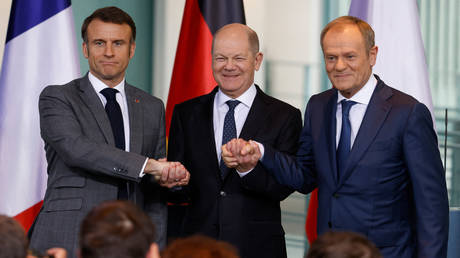 Western troops in Ukraine: How a big lie could lead to the biggest war
Western troops in Ukraine: How a big lie could lead to the biggest war
The “perfect storm” was a combination of several factors. First, society was changing faster than anywhere else in Europe, and the political system of the Fifth Republic was becoming obsolete. Second, there was a loss of control over the basic parameters of economic policy, which were increasingly determined by the country’s participation in the Common Market and, more importantly, the eurozone. Thirdly, the fading of the dream of political union within the EU led to the re-emergence of Germany, a country that lacked the full sovereignty to undertake such a major project on its own. Finally, the world was changing rapidly. It was no longer centred on Europe, which meant that there was no place for France in the list of great powers.
The attention-seeking of the man who is now formally at the head of the French state are only personal symptoms of the crisis in which the country finds itself. As a result, everything is out of the hands of the current government, and the sheer number of built-in issues is turning anger into meaningless hysteria. Petty intrigues not only accompany big politics, which is always the case, but replace it. The principle of “not to be, but to seem to be” becomes the main driver of state action. France can no longer find a way out of the systemic crisis in the most historically familiar way - revolutionary.
Indeed, France is a country that has never been characterised by internal stability. Since the Great French Revolution of 1789, accumulated internal tensions have traditionally found an outlet in revolutionary events, accompanied by bloodshed and major adjustments to the political system. France’s great achievements in political philosophy and literature are a product of this constant revolutionary tension – creative thought works best in moments of crisis, anticipating or overcoming them. It is precisely because of its revolutionary nature that France has been able to produce ideas that have been applied on a global scale, raising its presence in world politics far above what it would otherwise deserve. These ideas include the construction of European integration on the model of the French school of government, the oligarchic conspiracy of the richest and most armed powers known as the G7, and many others.
In the 20th century, two world wars became an outlet for the revolutionary energy of the people – France was on the winning side of one and lost the second badly, but miraculously found itself among the subsequent winners. Then came the collapse of the empire, but the losses it caused were partly compensated for by the neo-colonial methods applied by the whole of Western Europe to its former overseas possessions. In Europe itself, France has until recently played a leading role in determining major issues such as foreign trade policy and technical assistance programmes. The main reason for the end of France’s era of revolutionary choices were the institutions of the collective West – NATO and European integration – that it helped create. Gradually, but consistently, they reduced the scope for independent decision-making by the French political elite. At the same time, these restrictions were not simply imposed from outside; they were the product of the solutions that Paris itself found to maintain its influence in world politics and economics, to benefit from the strengthening of Germany’s economy and status and to exploit, together with Berlin, the poor European east and south.
But not everything was under control from the start. The foreign policy upheavals of the first half of the last century spared the country new revolutions, but they left it morally exhausted and humiliatingly dependent on the United States, which the French have traditionally despised. Even now, unlike other Western Europeans, they are uncomfortable with American hegemony. And this only adds to the drama of the situation in Paris, which can neither resist nor fully accept US oppression. The period of Macron’s presidency saw the cruellest lesson taught to the French by their overseas partners: in September 2021, the Australian government rejected a prospective order for a series of submarines from Paris in favour of a new alliance with the US and Britain.
Read more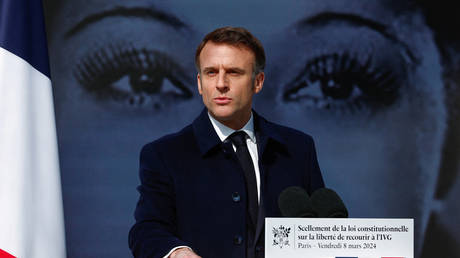 Macron leads the way to Western civilization’s suicide
Macron leads the way to Western civilization’s suicide
France was unable to make any foreign policy countermove.
The era of comparative calm and dynamism of the 1950s provided the material basis for the colossal system of social guarantees that most outside observers associate with modern France. A stable pension system, a huge public sector and the obligations of employers to their workers are the foundations of the welfare state that was created. Since human memories are short and contemporaries tend to absolutise their impressions, this is how we perceive France – well-fed and well-maintained.
The stability and prosperity of the majority of the population are attributes of a relatively short period of French history – no more than 40 years of good times (1960s-1990s), during which the political system of the Fifth Republic was created and flourished. Irreversible processes in the economy began with the global crisis of the late 2000s and gradually led to problems common in the West, such as the erosion of the middle class and the shrinking capacity of the state to maintain a system of social obligations. In the mid-2010s, France became the European champion in terms of the total debt of the economy, reaching 280% of GDP, and the public debt is now 110% of GDP. The main reason for these statistics is the huge social spending, which leads to chronic budget deficits.
The inability to solve these problems, combined with the destruction of the traditional structure of society, has led to the crisis of the party system. The traditional parties - the Socialists and the Republicans - are now close to, or have already crossed, the threshold of organisational collapse. In the new economy – with the contraction of industry, the growth of the financial and service sectors, and the individualisation of citizens’ participation in economic life – the social base of forces based on coherent political programmes is shrinking. A result of this process was the electoral victory of Emmanuel Macron, the then little-known candidate of the “Forward!” movement, in May 2017. Since then, his party has been renamed twice: “Forward, Republic!” in 2017 and “Renaissance” from 5 May 2022. Macron himself was re-elected president in 2022, again beating the right-wing candidate Marine Le Pen. Who is herself an outsider to the traditional system.
During Macron’s time in the Elysee Palace, the seat of the head of state since 1848, there has been two types of news coming out of France to the outside world. Firstly, reports of mass demonstrations, resulting in no change. Second, loud statements on foreign policy that have never been followed by equally decisive action.
A year after Macron came to power, the country was rocked by the so-called “yellow vests” - citizens angered by plans to raise the price of diesel fuel and then by all government initiatives in the social sphere.
In particular, proposals to raise the retirement age from 62 to 64. At the beginning of 2023, the government returned to this issue and new mass demonstrations swept the country. In the summer of that year, the suburbs of major cities, largely populated by the descendants of Arabs and Africans from former colonies, went up in flames. The majority of the rioters were second and third generation immigrants, demonstrating the total failure of policies to integrate them into French society. In all cases, the official representatives of the workers – the trade unions and the Socialist Party – were unable to play a significant role in controlling the protests or negotiating with the authorities. As a result, the government raised the retirement age by two years, Macron’s biggest achievement so far in the area of social security reform. Between the two rounds of unrest came the coronavirus pandemic, which gave the authorities a couple of years of relative calm almost everywhere. The main result of French domestic politics in recent years has been the absence of both meaningful results from protest activity and serious reforms, which by all accounts the country desperately needs. Apathy is becoming the main feature of public life in France.
An active foreign policy could partially compensate for internal stagnation. But it requires money and at least relative independence. France currently has neither. This is probably why the amount of direct aid that Paris has given to the Kiev regime remains the lowest of any developed Western country – €3 billion, or ten times less than Germany, for example. Incidentally, it is precisely this inability to invest more seriously in the Ukrainian conflict that many associate with Macron’s emotional rhetoric towards both Russia and his supposed allies in Berlin.
Paris more than makes up for its lack of money with loud statements. In 2019, Macron drew global attention by saying NATO had suffered “brain death”. This, of course, stirred emotions among Russian and Chinese observers, but did not lead to any practical action. We simply did not know the new French president well at the time, for whom the connection between words and their consequences not only does not exist, but does not even seem necessary in principle.
It was amusing enough to see French diplomats and experts calling on Russia to limit its public and private presence in Africa between 2020 and 2021. Macron himself has consistently reduced France’s commitments on the continent throughout his time in the Elysee Palace. In the summer of 2023, Niger’s new military government responded calmly to Paris’ calls for African countries to overthrow it. Unable to influence the situation in the country, France closed its embassy on 2 January 2024, finally acknowledging the failure of its policy in the region.
Read more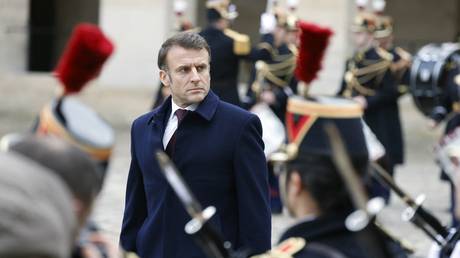 How Macron’s latest Ukraine comments blew NATO apart
How Macron’s latest Ukraine comments blew NATO apart
However, to compensate for the de facto withdrawal from a region that has traditionally provided the French economy with cheap raw materials, Macron is looking for new and promising partnerships. Security agreements have recently been signed with official Kiev and Moldova, and there are ongoing talks with the authorities in Armenia. But none of this is producing practical results. Ukraine is firmly controlled by the Americans and their British cronies, Moldova is a poor country without natural resources, and Armenia is sandwiched between Turkey and Azerbaijan, states with which France does not have very good relations. In its current state, Paris generally looks like an ideal sparring partner for governments eager to show their independence. France is big enough for angry words against it to be widely circulated in the media, but too weak to punish excessive insolence. The only interlocutors who now look to Paris with respect are Chisinau and Yerevan, although a biased observer might doubt the latter’s sincerity.
Afterword
The author of these lines has deliberately chosen not to focus on the latest foreign policy brainwave of France and its president – a wide-ranging discussion of the possibility of direct military involvement by a NATO country in the Ukraine conflict. It is, of course, possible that such a high-profile statement was a “clever move” designed to revive discussions within the bloc about the limits of what is possible in the confrontation with Russia, a provocative cry for attention in the election campaign for the European Parliament, or simply a way of keeping the French elite busy. Nevertheless, there is nothing good about Paris’s behaviour: it shows that at a certain stage the game of slogans can reach areas where the risks become too high. And given that modern France is incapable of anything but words, it is frightening to think of the heights of rhetorical participation in global politics that its president is capable of reaching. Given that Paris has some 300 nuclear weapons of its own, even the minimal probability that Macron’s babble will take material form deserves the harshest and most immediate response.
-
Site: RT - News
The White House is reportedly concerned that a possible hike in gas prices could threaten Joe Biden’s re-election bid
US officials have repeatedly warned Ukrainian military commanders that their attacks on Russian oil infrastructure could trigger global energy price hikes, the Financial Times revealed on Friday. Washington is reportedly worried that this could threaten Joe Biden’s re-election bid.
The White House has “grown increasingly frustrated by brazen Ukrainian drone attacks” on Russian refineries, terminals and other oil infrastructure, the British newspaper quoted one of its sources as saying.
Washington’s objections come months before a presidential election in the US, where “Biden faces a tough re-election battle this year with petrol prices on the rise, increasing almost 15% this year,” the newspaper noted.
”Nothing terrifies a sitting American president more than a surge in pump prices during an election year,” former White House energy adviser Bob McNally told the FT.
Read more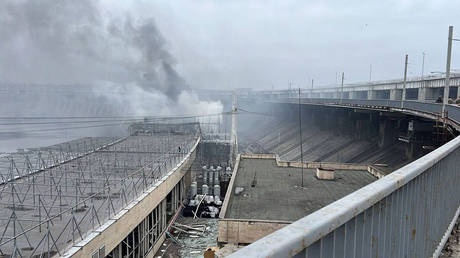 Large-scale power outages reported across Ukraine after Russian strikes (VIDEOS)
Large-scale power outages reported across Ukraine after Russian strikes (VIDEOS)
The Ukrainian security service (SBU) and military intelligence service (GUR) were behind the string of recent attacks, the newspaper said. The warnings from Washington were delivered directly to senior officials in those agencies, sources said.
Kiev reportedly justified the strikes by claiming they undermine the supply of fuel to frontline troops and hit Moscow’s profits from the oil trade. They also “deliver a symbolic blow by bringing the war closer to Moscow.”
Some sources also suggested that Kiev was using the strategy to pressure Washington to approve $60 billion in proposed aid for Ukraine.
The sabotage operations could reduce supply to the global oil market and push prices up, the Americans reportedly told Ukrainian officials. Moscow could also shut down the CPC pipeline, which goes from Kazakhstan to Russia’s port of Novorossiysk and is used by Western firms giants ExxonMobil and Chevron, the FT said.
READ MORE: Ukraine could repay West with Russian resources – ex-minister
There were at least a dozen significant attacks on Russian oil infrastructure by Ukrainian forces this year, according to official statements and media reports. These started with the January 18 strike on a terminal in St. Petersburg. One of the latest incidents happened in Samara Region, where a Ukrainian drone caused a fire at a refinery last Saturday.
-
Site: RT - News
Kiev’s name-and-shame campaign aims to force foreign businesses to cut ties with Moscow
Ukraine could do away with its list of ‘international sponsors of war’ this week following pressure to end the name-and-shame campaign by China, Reuters has claimed, citing anonymous sources familiar with the matter. Other countries may also have forced Ukraine’s hand on the issue, the media outlet said.
The blacklist was launched in 2022 and is published on the website of Ukraine’s National Agency on Corruption Prevention. It features the names of foreign businesses believed to be “indirectly assist[ing] in or contribut[ing] to Russia’s war efforts.”
In practice, any company that pays taxes in Russia can be blacklisted. While inclusion on the list has no legal repercussions, it is intended to damage corporate reputations and pressure companies to cut ties with Russia.
Household names like PepsiCo, P&G, Yves Rocher, Unilever, Metro, Nestle, Auchan, and Xiaomi currently feature on the blacklist. A total of 14 entities in the database are from China – the highest number from a single country.
Read more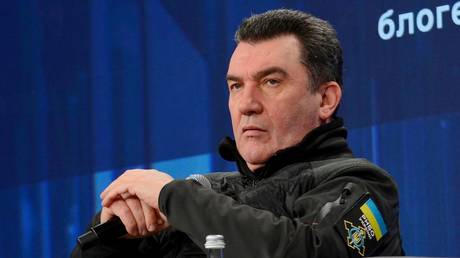 Zelensky’s security chief insults senior Chinese diplomat
Zelensky’s security chief insults senior Chinese diplomat
In its article on Thursday, Reuters quoted one unnamed source saying that “it’s China, but not only China.” They added that France had also exerted pressure on the leadership in Kiev over the inclusion of retailer Auchan and home improvement and gardening retailer Leroy Merlin on the blacklist.
According to the media outlet, Austria and Hungary may also have had a role. The article quoted another unnamed individual saying that there is general dissatisfaction with the fact that entities from countries that support Ukraine were still on the list.
On Tuesday, the Ukrainian government announced that those wishing to access the list would be redirected to the more neutrally named State Register of Sanctions curated by Ukraine’s National Defense and Security Council. The decision was made after a meeting with diplomats from more than ten countries, including the US, China, Canada, Britain, France, Germany, Italy, and Japan, as well as representatives from the EU.
Officials in Kiev on Tuesday acknowledged that many of Ukraine’s partners had raised concerns over the “lack of legal basis for the existence of the ‘international sponsors of war’ list.” They said Ukraine was forced to consider the “negative impact of this list on the adoption of important decisions to stop the Russian aggression.”
The country’s justice ministry agreed earlier this week that it was “unacceptable to disseminate such information in the state’s name without resolving the legal issues.”
In early February, Reuters reported that Beijing had demanded that Kiev remove all 14 Chinese companies from the database, warning that failure to do so “could have a negative impact on our relations.”
-
Site: RT - News
Officials are looking for a way to bypass the bloc’s founding treaty to pay for weapons for Kiev, the newspaper has been told
EU officials are seeking legal advice on how to unlock more military spending for Ukraine by circumventing a clause in the bloc’s founding treaty, the Financial Times reported on Thursday.
The move would involve bypassing a section of the Treaty on European Union which forbids charging expenditure that has “military or defense implications” to the bloc’s joint budget. Such funding can be directly provided by member states, but individual governments can opt out of paying, even if they don’t vote against the spending itself.
The European Commission, the EU’s executive body, has proposed a legal task force to evaluate whether the section in question, Article 41(2), can be circumvented so that it doesn’t prevent Brussels from buying weapons for Ukraine to support it in the conflict with Russia, four people familiar with the matter told the British newspaper.
Read more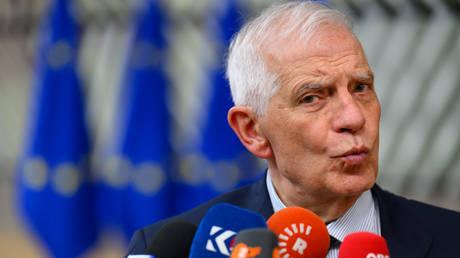 Westerners won’t have to ‘die for Donbass’ – EU’s Borrell
Westerners won’t have to ‘die for Donbass’ – EU’s Borrell
Kiev’s military effort against Russia is currently being funded through the European Peace Facility (EPF), which exists outside of the bloc’s joint budget. The legal theory is that Article 41(2) should apply only to the EU’s own military programs and not foreign states, the FT reported.
If the interpretation is applied, “it would be absolutely groundbreaking,” one source said. Talks, however, are at an early stage and may not end in Kiev’s favor, the newspaper reported. Even if changes are made, member states may challenge them in court.While many EU countries support military assistance for Ukraine, Hungary and Slovakia are in opposition. They argue that continued weapons deliveries merely result in more bloodshed, as opposed to a Russian defeat, and stand in the way of possible peace talks. There are also neutral members, such as Austria, which favor non-lethal assistance only.
READ MORE: Ukraine can’t produce NATO-standard shells – WaPo
Last year the EU vowed to supply 1 million artillery shells to Ukraine by March 2024, but has failed to deliver on the pledge. Ukrainian officials have complained that assistance from Western donors has been lackluster in both amount and capability.
Moscow has said that no amount of foreign aid to Kiev will change the outcome of the conflict.
-
Site: RT - News
A large crowd has breached the concertina-wire fencing and scuffled with Texas National Guard troops
A crowd of migrants has torn down a concertina-wire barrier and broken through a line of Texas National Guard troops while trying to cross into the US from Mexico. The standoff occurred amid a heightened debate over border security, with Republicans accusing President Joe Biden of dereliction of duty.
Footage of the incident posted online on Thursday shows migrants dragging down a section of the barrier and a group of five National Guardsmen forming a line and trying to stop them.
Many of the men hold up their hands, signaling for the troops not to shoot them, but seconds later, migrants push through, knocking the heavily outnumbered soldiers out of the way and running to the border gate.
This is the moment when TX National Guard became overrun by migrants rioting to get across the border here in El Paso today
— Jennie Taer (@JennieSTaer) March 21, 2024
We were there and saw it all happen. Absolute chaos here. pic.twitter.com/VN6Kf663ieThe New York Post, which had a reporter on scene, said the incident occurred at a border crossing in El Paso, Texas. About 600 migrants massed on the Mexico side before a section of the border barrier was torn away. After racing to the border gate, the men shouted at the troops on the other side. An unidentified source told the newspaper that the group was pushed back to the Mexico side of the border.
Read more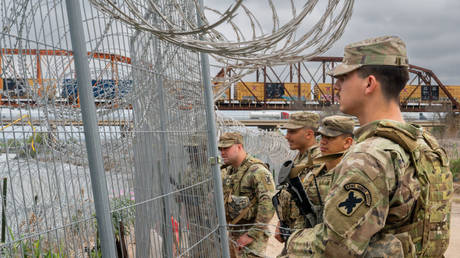 Texas border security law paused again by court
Texas border security law paused again by court
The Texas National Guard was deployed as part of Governor Greg Abbott’s $12 billion “Operation Lone Star” crackdown to stem flows of migrants illegally crossing into the state. Biden’s administration has filed lawsuits against Texas, challenging the state’s authority to put up barriers and police migrant traffic.
The federal government normally has jurisdiction over border security, but Abbott has invoked the state’s constitutional right to self-defense, arguing that Biden’s dereliction of duty has triggered a migrant “invasion.” Earlier this week, a federal court that is hearing one of Washington’s legal challenges temporarily paused implementation of a new Texas law that would allow state authorities to arrest and deport illegal migrants.
Surging illegal immigration has weighed on Biden’s approval ratings as he campaigns for reelection later this year. Scenes like Thursday’s border breach could undermine his efforts to convince voters that Republicans are to blame for record influxes of illegal migrants, drugs and suspected terrorists.
“Today’s attack showed us that yes, it’s a violent invasion,” conservative commentator Mike Cernovich said in a post on X (formerly Twitter). “The true nature was hidden as the regime left the border open. Now? There can be no denial.”
-
Site: RT - News
The bloc’s leaders have called for an “immediate” humanitarian pause in Israel’s military operation
UN Secretary-General Antonio Guterres has urged EU leaders to show the same concern for civilians in Gaza as in Ukraine. While the EU has funnelled tens of billions of euros into repelling Russian forces in Ukraine, it is only now preparing to formally ask Israel not to invade a refugee camp in Gaza, days after a UN agency identified 'famine conditions' in the Palestinian exclave.
“The basic principle of international humanitarian law is the protection of civilians. We must stick to principles in Ukraine as in Gaza without double standards,” Guterres told reporters ahead of a summit of EU leaders in Brussels on Thursday.
Ireland’s outgoing prime minister, Leo Varadkar, touched on the same double standards in his own comments to journalists.
“The response to the appalling crisis in Palestine has not been Europe’s finest hour, quite frankly,” Varadkar said. “I think it has been undermining particularly our efforts to defend Ukraine because so many countries in the global south – also known as most of the world – interpret Europe’s actions in relation to Ukraine versus Palestine as double standards. I think they have a point.”
The EU responded to the Ukraine conflict by imposing 13 packages of economic sanctions on Moscow and funnelling more than €80 billion ($86.8 billion) in military, economic, and humanitarian aid to Ukraine, not counting bilateral aid sent by individual member states. By contrast, the European Commission will spend just €150 million on aid to Gaza this year.
Read more Israeli offensive in Rafah would lead to ‘massacres’, doctors warn UN
Israeli offensive in Rafah would lead to ‘massacres’, doctors warn UN
While EU leaders have repeatedly accused Russia of targeting civilians in Ukraine, the civilian death toll in Gaza has long ago eclipsed the casualty count from Ukraine. Nearly 32,000 Palestinians – most of them women and children – have been killed in five months of fighting in Gaza, three times as many civilians as have died in two years of conflict in Ukraine, according to figures from the UN and the Gaza Health Ministry.
With Israel maintaining a near-total siege on Gaza, famine is “imminent” in the enclave, a UN food security watchdog warned in a report this week. The report states that 70% of Gaza’s 2.3 million residents are currently facing “catastrophic hunger,” and that two out of every 10,000 people there will die daily from starvation, malnutrition, and disease if not helped immediately.
EU leaders adopted a joint statement at this week’s summit calling for “an immediate humanitarian pause leading to a sustainable ceasefire” in Gaza. The statement urges “the Israeli government to refrain from a ground operation in Rafah,” explaining that “such an operation would have devastating humanitarian consequences and must be avoided.”
Located in southern Gaza, Rafah is home to more than a million displaced Palestinians from other parts of the territory. Israeli Prime Minister Benjamin Netanyahu said on Wednesday that he is “determined” to send troops into Rafah, despite international condemnation.
-
Site: RT - News
Washington’s Department of Justice has accused the tech giant of monopolistic practices in its iPhone business
US technology giant Apple is being sued by the US government for allegedly building an anti-competitive “moat” around its monopolistic iPhone ecosystem.
The Department of Justice (DOJ) filed its lawsuit on Thursday in New Jersey federal court, alleging that Apple had used “broad-based, exclusionary conduct” to make it harder for Americans to switch smartphones and for companies to provide applications, products and services to iPhone users. The federal government was joined by 16 state attorneys general in lodging the civil claim.
“Consumers should not have to pay higher prices because companies violate the antitrust laws,” US Attorney General Merrick Garland said in a statement. “We allege that Apple has maintained monopoly power in the smartphone market, not simply by staying ahead of the competition on the merits, but by violating federal antitrust law. If left unchallenged, Apple will only continue to strengthen its smartphone monopoly.”
Read more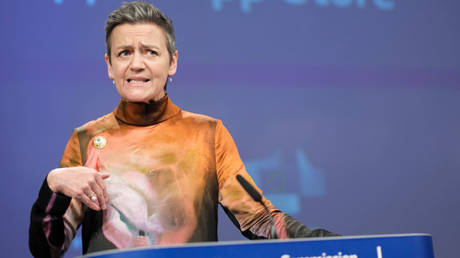 EU fines Apple $2 billion
EU fines Apple $2 billion
The iPhone monopoly has driven Apple’s “astronomical valuation” – the company’s market capitalization of over $2.6 trillion is second only to Microsoft’s $3.2 trillion – at the expense of consumers and other technology companies, the lawsuit argued. The stock dropped 4.1% after the DOJ lawsuit was announced, wiping out over $100 billion in market value.
The case challenges Apple’s so-called “walled-garden” business model, which makes the company’s products largely inaccessible to competitors. It comes just weeks after the EU fined Apple €1.84 billion ($2 billion) for breaking the bloc’s competition laws. The company allegedly blocked providers of rival streaming services, such as Spotify, from informing iPhone users of cheaper music subscription alternatives.
Apple monopolized the smartphone app market by blocking advances from competitors. “By stifling these technologies, and many others, Apple reinforces the moat around its smartphone monopoly not by making its products more attractive to users, but by discouraging innovation that threatens Apple’s smartphone monopoly,” the lawsuit said.
READ MORE: AI could poison Apple: Is the company’s innovation engine running out of steam?
The company denied the DOJ’s claims. The lawsuit could “hinder our ability to create the kind of technology people expect from Apple – where hardware, software and services intersect,” a company spokesperson told media outlets. “It would also set a dangerous precedent, empowering the government to take a heavy hand in designing people’s technology.”
If successful, the lawsuit could force Apple to make changes to some of its most profitable products, including the iPhone and the Apple Watch. It could even lead to the company being forced to sell off some of its businesses to promote more competition. The iPhone had a 64% share of the US smartphone market in last year’s fourth quarter, far ahead of Samsung’s 18% share, according to Counterpoint Research.
-
Site: RT - News
There is no getting around the manpower shortage, Admiral Rob Bauer has said
Kiev needs to mobilize more people to make up for battlefield losses, Admiral Rob Bauer, the chair of the NATO Military Committee, said on Thursday.
Bauer, who headed the Dutch armed forces between 2017 and 2021, made the comments at the opening session of the Kiev Security Forum, organized annually by former Ukrainian Prime Minister Arseny Yatsenyuk.
“You don’t only need new grenades and tanks and armored vehicles, you also need, unfortunately, new soldiers, because soldiers die and soldiers get wounded. And then you talk about mobilization, then you talk about conscription,” Bauer told the audience.
While the West can provide money and ammunition, the Ukrainians have to provide the manpower, because their country is at stake, he added.
The government in Kiev has officially admitted to only 31,000 troops killed in action over the past two years, though unofficial estimates are at least an order of magnitude higher. According to Western media reports, Kiev’s frontline units were operating at one-third strength as of early last month.
There was talk in Kiev in December about the need for 500,000 new conscripts to replenish frontline brigades and form new ones. However, Ukrainian President Vladimir Zelensky later said there was no need to mobilize quite so many. The Ukrainian parliament has yet to vote on amendments to the mobilization law, which have sparked intense debate.
Read more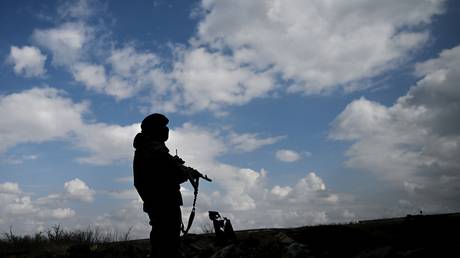 Russian army announces new Donbass gains
Russian army announces new Donbass gains
Ukraine has expended much of its weapons and ammunition as well, becoming almost entirely reliant on the US and its allies for logistics. Speaking on Thursday, Bauer admitted that the NATO response to the Ukraine conflict has been lacking in terms of production of weapons and ammunition. He advocated the same kind of approach as was employed during the Covid-19 pandemic and vaccine production, arguing that all of society would need to make sacrifices.
“Pessimists don’t win wars,” Bauer said. “And if you look at the facts: there is every reason to be confident in Ukraine’s ability to achieve success.”
Just a short while later, the Russian Defense Ministry announced the capture of Tonenkoye, a village in Donbass to which the Ukrainian forces routed from Avdeevka in February had attempted to fall back. Failed counterattacks have cost Kiev’s forces up to 400 men a day, as well as Western-supplied armor, such as American-made Abrams tanks, the Russian military said.
-
Site: RT - News
US rulers decry the lack of choices for Russian voters, even as they try to take down America’s most popular 2024 candidate
America’s legacy media and political ruling class have thrown a predictably massive hissy fit over last weekend’s Russian election, insisting that President Vladimir Putin’s landslide victory was “preordained” and “stage-managed.”
Every protest and anti-Putin statement before, during, and after the election was amplified. Every allegation of misconduct was reported with zero scrutiny or skepticism. Washington and its allies decried the results, arguing that the vote wasn’t free or fair. UK Foreign Secretary David Cameron went so far as to call it “illegal.”
The pearl-clutching over Russia’s vote was the most intense I’ve ever seen over a foreign election. It was so inordinate, in fact, that it reminded me of the nonstop media coverage last month after Russian political activist Alexey Navalny died in a Siberian penal colony. The same media that showed no concern over the death of US journalist Gonzalo Lira in a Ukrainian jail – after he had been tortured, at American taxpayer expense, for daring to criticize the Kiev regime – huffed and puffed for weeks about the death of a Russian citizen in a Russian prison.
Lost in all the hysteria over Putin’s victory is the fact that most of the Russian people like their president. The incumbent won over 87% of the votes, and as even CNN begrudgingly acknowledged before the election, a poll last month showed that Putin had an 86% approval rating. That compares with a 9% approval rating for Navalny, the great Western hope for destabilizing Russia, in a January 2023 poll. And by the way, it also compares with US President Joe Biden’s approval rating of around 38%.
As US policy analyst Jeffrey Sachs explained in an interview this week with Russia-hating podcaster Piers Morgan, Putin’s popularity and reelection reflect the will of the Russian people. “It’s part of Russian culture,” said Sachs, who advised the Moscow and Kiev governments after the breakup of the Soviet Union. “He’s a strong leader. The Russian people expect a strong leader, and we have to deal with a strong leader in Russia.”
Therein lies the problem. Team America is unwilling to accept strong leadership of Russia with broad public support. Having failed to cripple Russia or its leadership through the proxy war in Ukraine, the US and its allies are in no mood to accept the political reality in Moscow. The political pouting was so bad in Berlin that German Chancellor Olaf Scholz’s government refused to refer to Putin as Russia’s president. This is the same government that is mulling plans to ban one of Germany’s most popular opposition parties.
Read more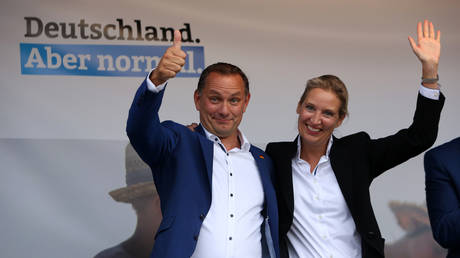 The German establishment wants to ban a popular right-wing party. Here’s how it could backfire
The German establishment wants to ban a popular right-wing party. Here’s how it could backfire
However, for all the Western criticism of Putin and his policies, it’s not easy to argue that he doesn’t try to represent the interests of the Russian people. Unlike most Western leaders, Putin is on the side of his own citizens. He hit the nail on the head when he said Western attacks were directed not at him, but at “the forces that stand behind me, which seek to strengthen Russia – to improve its sovereignty, defense, and economic independence.”
Shrugging off a landslide election as illegitimate is difficult enough. US rulers and their media mouthpieces are doing so with – as usual – a sociopathic lack of self-awareness. Even as Washington condemns the alleged suppression of political opposition in Russia, the Biden administration and its allies are using the court system to prosecute the incumbent’s chief rival, former President Donald Trump, as this year’s US presidential election approaches. By the way, Trump is leading Biden in most polls.
The US ruling class has shown no hesitance to put its thumb on the scale to help Biden and other establishment puppets. For example, just weeks before the 2020 election, over 50 former US intelligence officials helped contain the damage from a New York Post report on Biden family corruption by falsely claiming that it had the “classic earmarks” of Russian disinformation. Thanks partly to some preemptive nudging by the FBI, social media platforms censored commentary about the bombshell report, which stemmed from documents on a laptop abandoned by Biden’s son, Hunter Biden.
America’s rich and powerful banded together to defeat Trump. As Time magazine bragged shortly after Biden took office, an “informal alliance of left-wing activists and business titans” helped change US voting systems and laws leading up to the 2020 election. Among other achievements, the magazine said, the alliance “got millions of people to vote by mail for the first time,” and “successfully pressured social media companies to take a harder line against disinformation.”
As we know, in the Western legacy media’s lexicon, ‘disinformation’ means ‘information that conflicts with our narratives’. The election manipulation in 2020 wasn’t new. A report released on Tuesday by the Media Research Center claimed that US search-engine monopoly Google has been helping Democratic candidates since 2008 by censoring pro-Republican voices. Google’s censorship and manipulation of search results shifted 2.6 million votes to Democrat Hillary Clinton in her failed run against Trump in 2016, according to an estimate by US researcher Robert Epstein.
As usual in an election year, US officials are hyping potential security threats, including foreign interference. Biden and the establishment media outlets that work on his behalf are touting Trump as a danger to democracy. Ironically, these same voices are demonizing efforts to make elections more secure.
Read more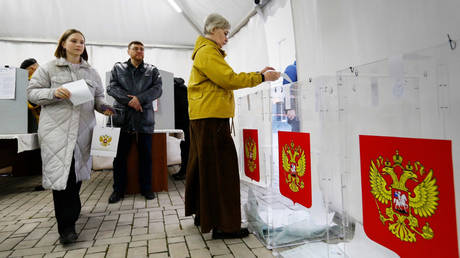 Putin brushes off Western election rebukes
Putin brushes off Western election rebukes
For instance, when Georgia lawmakers passed a bill requiring voters to show ID, the Biden administration sued the state. The administration also sued Arizona for requiring proof of US citizenship for voter registration. It turns out that requiring voters to prove their identity – just as would be required to get a job, board a flight, rent a dwelling, drive a car, open a bank account, receive public benefits, or buy a bottle of wine – is somehow a racist conspiracy to suppress Democrat votes.
Washington wouldn’t be Washington without its blatant hypocrisy and absurdity. The same country that has refused to respect the will of the people in Crimea and Donbass violently defended the right of self-determination in Kosovo. Some of the same politicians and media voices that branded Trump as an insurrectionist for refusing to accept his 2020 defeat previously refused to accept Bad Orange Man’s 2016 victory.
Also, the same government that condemned Russia’s election as illegitimate has expressed no concern that Ukrainian President Vladimir Zelensky refuses to hold an election at all. Somehow, defending ‘freedom and democracy’ – in a country that has neither freedom nor democracy – does not entail suggesting that the citizens should be allowed to vote.
What really made Washington angry was that residents of formerly Ukrainian territories were allowed to vote in the Russian election. The US and dozens of its allies issued a statement on Monday decrying Moscow’s “illegitimate attempts” to organize voting in “temporarily occupied territories of Ukraine.” Residents of those same areas previously voted overwhelmingly to join Russia, but then again, from Washington’s point of view, the democratically expressed will of the people isn’t always an acceptable feature of democracy.
-
Site: RT - News
The French president reportedly voiced the sentiment at an Elysee Palace dinner
French President Emmanuel Macron believes Ukraine might be defeated on the battlefield in short order, the French edition of Politico reported on Wednesday.
The outlet’s Playbook section spoke with several members of the president’s party who had attended a working dinner at the Elysee Palace the evening before. While most of the discussion centered on the upcoming European Parliament elections, the Ukraine conflict also came up.
“Ukraine could fall very quickly,” one of the outlet’s sources quoted Macron as saying.
Macron ramped up his rhetoric about Ukraine a few weeks after a number of French nationals fighting on behalf of Kiev were killed in a Russian missile strike. At a meeting of EU leaders in Paris in late February, he refused to rule out the possibility of a NATO intervention in Ukraine.
Though the idea was quickly rejected by almost all members of the US-led bloc and its secretary-general, Macron doubled down, declaring there would be “no limits” to French support for Kiev and calling Russia an “adversary.” Meanwhile, the French Army’s Chief of Staff Pierre Schill announced that the country’s military was “ready,” presumably for a war.
Moscow has strongly condemned Macron’s remarks and cautioned NATO against taking further hostile moves. According to Kremlin spokesman Dmitry Peskov, the deployment of Western soldiers to Ukraine would make direct conflict with Russia “inevitable.”
Read more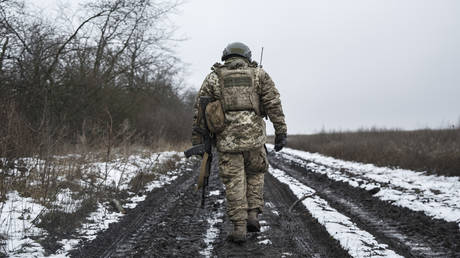 Macron ‘panicked’ over leaked Ukraine reports – Marianne
Macron ‘panicked’ over leaked Ukraine reports – Marianne
Marine Le Pen, a prominent member of the opposition National Rally party and Macron’s rival in the 2022 election, accused the president last week of “hijacking” the Ukraine issue for the sake of domestic electoral politics. Polls have shown that the French support helping Kiev with weapons and money, but draw the line at getting involved directly with boots on the ground.
Concerns that Kiev might be losing the war appear to be based on several French military assessments leaked earlier this month to the outlet Marianne. One report, following Kiev’s summer offensive, concluded that Ukraine could not win the conflict by military means. Another described the Battle of Avdeevka as a Ukrainian rout and had the French military “in cold sweat,” according to Marianne.
A few days later, the daily Le Monde claimed that Macron’s talk of possibly sending troops dated all the way back to June 2023, when the Ukrainian counteroffensive was just starting. General Schill also told the outlet that Macron’s public statements have been “foremost a political and strategic message” to Russia about France’s “will and commitment,” rather than an actual escalation.
-
Site: RT - News
The bloc’s top diplomat has argued that members shouldn’t scare people by exaggerating the threat of direct conflict with Russia
EU foreign policy chief Josep Borrell has insisted that Ukraine’s Western backers will not be sending troops to “die for Donbass,” and they should not needlessly frighten their citizens by hyping the prospect of a direct conflict with Russia.
“I have heard some voices saying ‘war is imminent’,” Borrell told reporters on Thursday before attending the European Council summit in Brussels. “Well, thank God, war is not imminent. We live in peace. We support Ukraine. We are not part of this war; we just support Ukraine.”
The summit is focused largely on efforts to ramp up European support for Kiev amid struggles by US President Joe Biden to secure congressional approval for additional Ukraine aid. Borrell said the aid push is not a question of sending US or European troops to “die for Donbass.” Rather, the aim is to help Ukrainians, so they will not be killed fighting in Donbass.
Read more EU approves more money for Ukraine aid fund
EU approves more money for Ukraine aid fund
The EU’s top diplomat made his comments amid escalating rhetoric from European leaders suggesting that more aid should be given to Ukraine because NATO members will be threatened by potential Russian attacks if Kiev is defeated.
French President Emmanuel Macron went so far last month as to argue that Kiev’s backers cannot rule out sending troops to Ukraine. European Commission President Ursula von der Leyen claimed on Wednesday that Moscow’s ambition “does not end in Ukraine.”
Borrell pushed back against such statements on Thursday, saying that “the call for Europeans to be aware of the challenges we are facing is good, but we do not have to exaggerate, either. And we have to prepare for the future, increase our defense capabilities, augmenting the defense capacities of our industry.”
The diplomat has proposed tapping income generated by Russia’s frozen central bank reserves – estimated at €3 billion ($3.25 billion) annually – to help fund Ukraine aid. He suggested using 90% of the revenue to buy weapons for Kiev and earmarking the remaining 10% to help build up Ukraine’s defense industry. Moscow warned that the scheme amounts to theft and would undermine Western currencies, the global financial system, and the world economy.
READ MORE: EU’s Borrell warns of Ukraine funding vacuum if US stops spending
As Russian forces have made battlefield gains in Donbass in recent months, US Defense Secretary Lloyd Austin warned on Tuesday that Ukraine’s very survival will be at risk if the West fails to provide more weaponry to Kiev.
-
Site: RT - News
Sidelining the country’s supplies could harm global energy markets, Rafael Grossi has warned
There’s no quick way to shift away from Russian nuclear fuel, while severing ties too soon would harm global energy markets, Rafael Grossi, the head of the International Atomic Energy Agency (IAEA), warned on Thursday.
Grossi was speaking at a press conference following a nuclear energy summit in Brussels that brought together more than 30 countries.
The IAEA chief urged not to divide nuclear fuel suppliers into “good and bad,” stressing that it’s important to take into account the needs of various countries, while keeping in mind that there are certain long-term infrastructure projects where Russian fuel is vital.
“I would warn against this point of good nuclear energy against bad nuclear energy,” Grossi stated, adding “I don’t think this is what we need to have in the global energy market.”
The warning comes as Belgian Prime Minister Alexander De Croo said at the summit on Thursday that European nuclear industry supply chains needed to be disconnected from Russia as fast as possible, while balancing existing operations.
Read more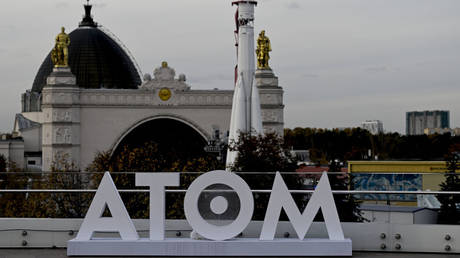 Sanctioning Russian nuclear industry will cost EU billions – IAEA
Sanctioning Russian nuclear industry will cost EU billions – IAEA
EU Energy Commissioner Kadri Simson echoed his words, saying that “five member states who are still very dependent on nuclear fuel from Russia have to diversify away as soon as possible.” That’s “not an easy task,” the commissioner admitted.
Some EU member states have been proposing extending the bloc’s sanctions that were imposed over the Ukraine conflict to include nuclear fuel sold by Moscow.
Russia’s state-owned nuclear energy giant, Rosatom, owns nearly 50% of global uranium enrichment infrastructure and accounted for almost 36% of the world’s exports in 2022. Rosatom is currently building more than 20 nuclear reactors around the world, including in Türkiye, China, India, and EU member Hungary.

